19:45
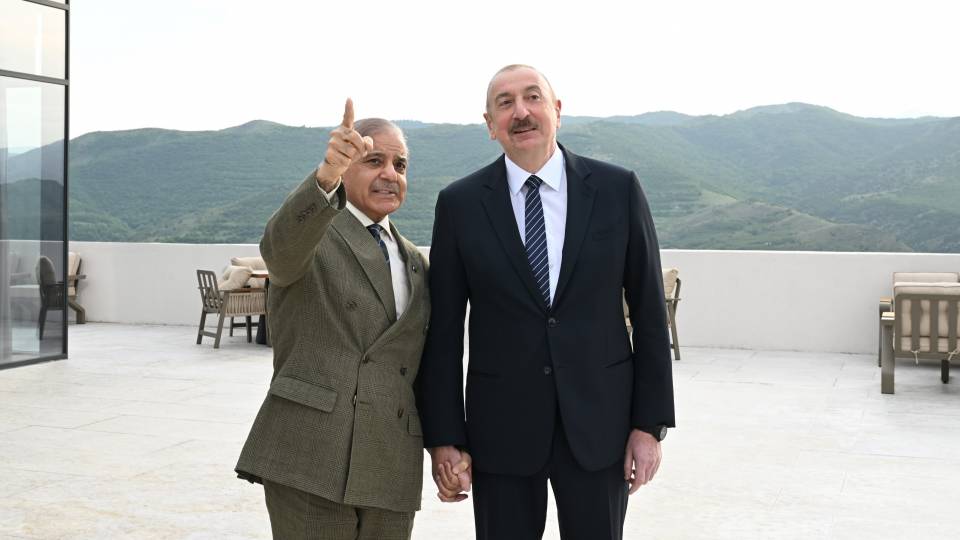
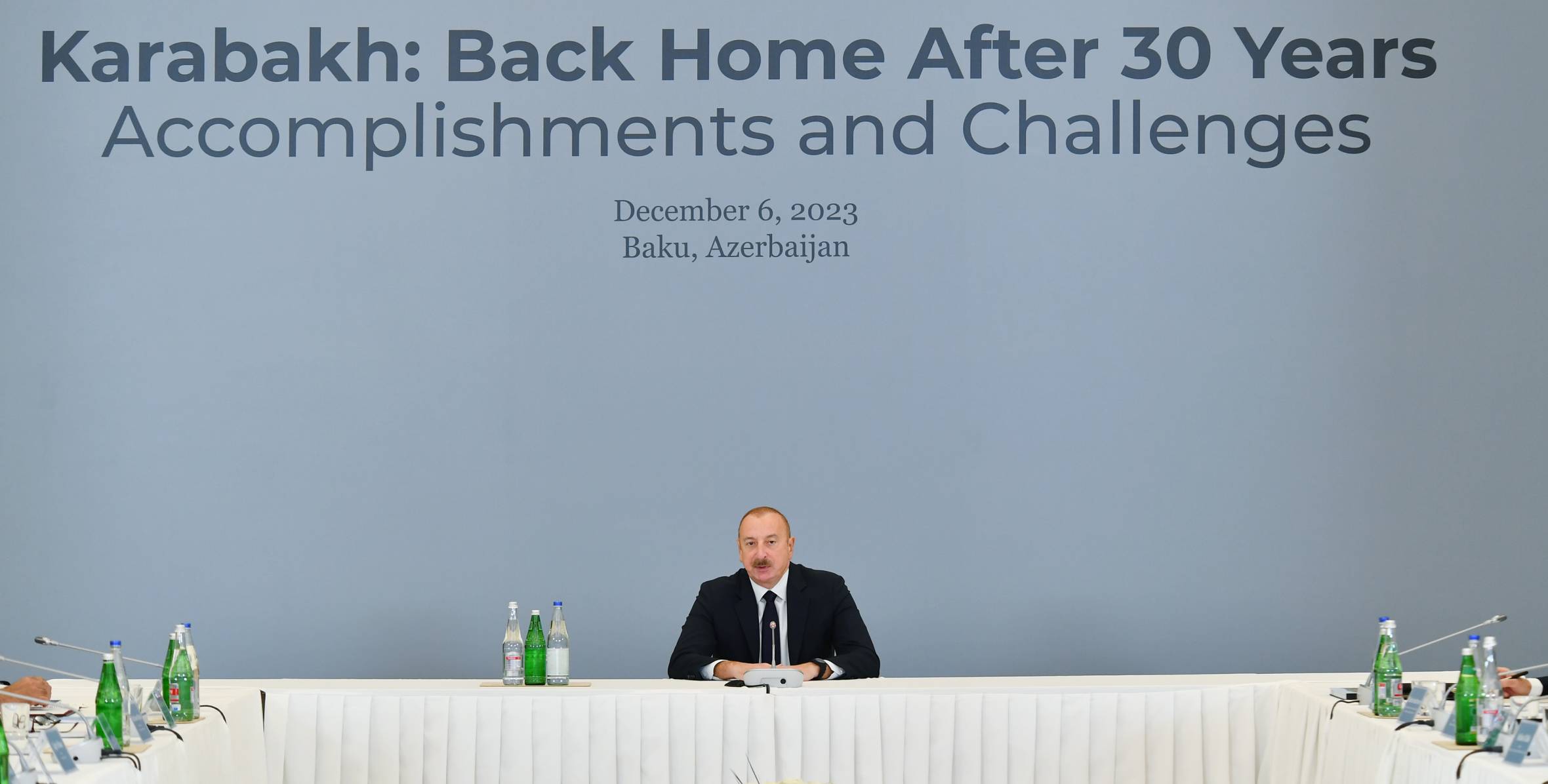
Co-organized by ADA University and the Center of Analysis of International Relations, the Forum titled "Karabakh: Back Home After 30 Years. Accomplishments and Challenges" has been held with the participation of President of the Republic of Azerbaijan Ilham Aliyev at ADA University.
Opening the Forum, Rector of ADA University Hafiz Pashayev said: Your Excellency, President Ilham Aliyev, dear participants of the ADA University Forum.
It is great honor and pleasure to welcome you, Mr. President, and all participants at our university at this historic time, when we can proudly say that Azerbaijan fully restored its territorial integrity and sovereignty. This remarkable achievement has been possible due to the visionary leadership of President Ilham Aliyev, who did outstanding long-lasting efforts in uniting all Azerbaijani nation behind common mission. This decisive victory has ended 30-year long occupation of Karabakh. Mr. President, please allow me to congratulate you with this unique achievement, and wish you great success in the redevelopment and reconstruction efforts in Karabakh.
The task ahead of us is gigantic. Alongside with infrastructure projects, the most important goal is a smooth return and resettlement of Azerbaijani IDPs. Close to 1 million ethnic Azerbaijanis were victims of the occupation with their homes being looted and ruined. At the request of the government, in the past three years, ADA university researchers have been meeting with IDP families and conducting various surveys in order to better understand their needs and priorities. Big majority of the respondents have expressed great desire to return back to their native towns and villages.
Yesterday, the participants of the forum have been able to witness amazing developments, which have taken place in the smart and eco-friendly village of Aghali in the liberated Zangilan region.
This forum with more than 60 foreign participants from renowned think tanks and research centers will allow us to further discuss the various social, economic, security and infrastructure aspects of the return process and the possible usage of the international experience in Azerbaijani context.
Mr. President, we thank you for agreeing to meet with participants of the forum and discussing issues related to the return of IDPs. Your vision on this matter will be very useful to all analysts and researchers who study our region and beyond. The floor is yours, Your Excellency.
President Ilham Aliyev: Thank you very much. Good morning, ladies and gentlemen. First of all, I'd like to express gratitude to Rector Hafiz Pashayev for the invitation. It's not the first time I participate in the ADA University Forum. Actually, I think, I didn't miss any of them. Last time, we met with a group of international experts in Shusha this May. I'm glad that this time you visited another liberated region of Azerbaijan, Zangilan, and witnessed the process of resettlement and reconstruction. I consider these kinds of gatherings very useful for me, because during this interaction we discuss many important issues. I also understand better what the questions are in the international expert community with respect to recent developments in our region.
Because situation in the region is changing. To a large degree, the initiator of the changes is Azerbaijan. This is natural, because we needed to fully restore our sovereignty over internationally recognized territory of Azerbaijan. We wanted to do it peacefully, the same way like we wanted to find a peaceful solution to conflict with Armenia for almost thirty years. But, unfortunately, it was not possible due to many reasons, which we already discussed broadly during our previous meetings.
Since May, when we met last time – not with the same group – but many of those, who were there in Shusha, are here today. The situation was different. We still had hopes that it would be possible to persuade Armenia’s leadership to comply with its international commitments, particularly, with the declaration, which the Armenian Prime Minister, the Russian President and myself signed in the early hours of the 10th November, 2020. We hoped that they would respect their own signature and make an important step in order to complete the long-lasting standoff. In other words, they had to withdraw their forces from Karabakh. They did not do it due to different reasons.
When we restored our sovereignty, two and a half years ago, we once again saw what we anticipated – a large number of Armenian military servicemen in Karabakh was positioned there without any respect to international law. Their numbers were close to 15,000 people. For three years, we were very patient and we hoped that finally, it would be possible to find the solution to the situation. We realized that the situation is not normal. Our proposals from the very beginning of the time - when the Second Karabakh War ended - were very clear. People who live in Karabakh have two options: either to become Azerbaijani citizens – we provided all the necessary legal and also security framework for that – or to find another place to live. There can be no other option. The other option can be a residence permit or work permit to live and to work in the country, which you don't consider to be your country.
So, that option was on the table and unfortunately, our appeals and our statements were not properly addressed.
After our meeting in Shusha last May, in the end of May, at the meeting with people who returned to Lachin - former refuges - I expressed my position on the situation and said that there is an opportunity to find a normal solution to this issue. I also said that the leaders of separatists have a chance for amnesty if they surrender. That was a public statement. But unfortunately again, my words were not properly assessed. So now, the leaders of separatists are in Azerbaijan. They wanted to come here and threatened us that they would come on tanks. But now, they are waiting for the Azerbaijani justice to say its word.
Despite that, we still hoped that we can establish contacts with the representatives of Karabakh Armenians. Unfortunately, those people there who monopolized the so-called power did not allow that to happen. Moreover, in September, there were two events, which actually were considered by us as crossing over the last red lines. First, the congratulation from the Armenian Prime Minister to the so-called nagorno-karabakh republic with respect to its so-called independence, which was totally in contradiction with what the Armenian Prime Minister said and signed. Because October last year was the time when the Armenian Prime Minister officially recognized Karabakh as part of Azerbaijan. After that, after many statements in the same direction, sending a congratulation letter to separatists is absolutely unacceptable, and is very contradictory.
And the second - just the week after that - and the last red line was so-called elections of the so-called president of the so-called nagorno-karabakh republic, which was also a total violation of verbal agreements after the Second Karabakh War, that nothing is going to be changed in that area.
So, one day, in even less than one day, the anti-terror operation totally allowed us to restore our sovereignty. As soon as the operation started – by the way, the operation was held without any damage to civilian infrastructure, any casualty among civilians – we announced that if the army laid down its weapons, we would stop and allow them to leave. So, it lasted less than 24 hours. After they announced that they surrender, all the actions on the ground had stopped.
So, this is actually what happened. I think, the most important events that happened since our last meeting in May. Now we are in the face of addressing several international challenges. Unfortunately, we face some misunderstanding from the countries, which we considered to be our partners. And we are trying to explain our position and also trying to explain that international law norms are obligatory for all. They should not be selective. And what has Azerbaijan done? It has done the right for self-defense based on UN Charter, Article 51. It was done based on international law and the sovereign right of Azerbaijan to control fully its territory as any other country should do.
You was in Zangilan yesterday. I know that my representatives in the liberated areas informed you about the reconstruction. I don't want to go much into details. Of course, if you have questions about that, I will be ready to answer, but I don't want to take much of your time, because if I start talking about what has been done during the last three years, our time will expire. So, I would prefer to stop now and continue our discussions.
Assistant to the President Hikmet Hajiyev: Mr. President, with your permission we can start our interactive discussion and a Q&A session. I will ask our distinguished participants present themselves. Please also identify your institution and country that you represent. First question, we will start with Ambassador Matthew Bryza.
Ambassador Matthew Bryza: Mr. President, Matthew Bryza, the Jamestown Foundation. Yeah, I agree that we're not gonna talk about the reconstruction. But, I have to say it was really impressive. The degree of strategic planning, the execution that's happening, the massive coordination, removing mines, restoring infrastructure, bringing people back already - and just talking to the rector before this. In our lifetimes, there's nowhere else where there's been such a huge area of devastation that’s going to be totally rebuilt. I mean, it's unprecedented and it's happening and we got to see it, so thank you for that. But my question is that… It is a comment and a question.
In my experience, working on the conflict for a while, a long time, it was consistently Azerbaijan's position and yours, that of course, you want to restore the sovereignty and territorial integrity of Azerbaijan. First and foremost, Azerbaijani displaced persons will return to their homes, but also your position as I recall, was that you wanted the Armenian population to remain, return and be neighbors again with Azerbaijanis and you gave several interviews during the war when you said that. Does Prime Minister Pashinyan really realize that and if so, is he trying to persuade his voters of the same? Thank you.
President Ilham Aliyev: First of all, thank you for your words about what you've seen and about our plans for reconstruction. We really try to do maximum in order to create most comfortable conditions for former refugees.
They deserve it, because they lived in difficult conditions for 30 years. It was not only physical conditions, but also psychological situation of people who were deprived from their homes for 30 years. And they lived waiting for the time when they can return. Now, when we liberated the territories, we do everything in order to speed up the process with full understanding about the dangers, as you mentioned, the mines is a major danger. At the same time, we want to do everything properly. We want the process to be as fast as possible, but with understanding that it must be done using the best architectural experience, the best technology, including green technology, and the best conditions for living.
So, actually, liberated territories will be a kind of a demonstration of a new approach in building of cities. So, I think, this experience will be very useful for many other countries and many cities, which face more or less the same.
For us, of course, the most important was to provide former refugees with decent conditions and with jobs. By the way, I'd like to tell you that employment is also one of the important areas, which we concentrate while planning the return process. So, most of the people who have been returned already have jobs and this once again demonstrates that the approach is absolutely comprehensive.
With respect to your question, I'd like to say that during these three years - after the end of the Second Karabakh War - on several occasions, I publicly stated that we consider Armenians living in Karabakh as our citizens. We think that they have been the subject of manipulation by the leaders of separatists. We offered them conditions under which they can stay and continue to live on that area. And that was totally in line with international law, as I already said. The only thing they had to do was that they had to apply for the Azerbaijani citizenship. The issues related to their security and rights have also been addressed. On many occasions, we said that their security will be provided in line with the Azerbaijani constitution, and the Azerbaijani commitment in front of international organizations. With respect to their rights, we publicly stated that their rights will also be provided based on that. The process was taking a long time, and then, we realized that there is a kind of barrier between us and Armenians in Karabakh. I don't know whether that barrier was built by the Armenian government or local separatists. Then, we decided to start talking, and I appointed a special representative of the President - one of members of our parliament – and assigned him with a task to start talking with the representatives of Armenian community. We even agreed that the first meeting would take place in Khojaly – at that time still under occupation – in the premises of the Russian peacekeeping forces. That meeting took place. It was the first meeting, where we made a proposal that we want them to stay and to integrate. And the word reintegration, which I use many times, unfortunately, was met with a kind of irony, both from the Armenian government and also from separatists. The same separatists who now wait for the verdict in the detention center. Our proposal was to organize the second meeting in the city of Yevlakh, which is very close to Karabakh area, less than one hour drive and to have these meetings regularly. Unfortunately, the Karabakh Armenians, I mean those who consider themselves leaders refused. So, many times, at least twice, we made a public statement that we invite them and they refused.
So, there were no contacts. They did not want even to talk to us. Then, we decided to go through different channels. We made it public. We made public our proposal for reintegration. It was published, you can find it. Anyone can get acquainted with that. We opened a reintegration electronic portal, where everyone can register as a person who wants to get the Azerbaijani citizenship. All the rights, which we offered to them, of course, was also a subject for further consultations. But what we offered to them was absolutely acceptable and based on the best practices based on European conventions on national minorities, European Conventional languages, the right for education in their own language, religious rights, cultural rights, municipal rights – to select their representatives through municipal elections. We even deliver the message to them that we will have a municipal elections in the end of 2024, so, they will participate. They will select their representatives, who will be the leaders of the municipalities.
So, what else should we have provided or offered? It was maximum and it was totally transparent. This proposal was sent by us to those capitals, which wanted to be mediators. I mean the European Union, Brussels and Washington. So, we did it absolutely transparently. But their answer was no. And you know, when they agreed to meet? Only after 20 September. After September 20, when we already had to use force in order to restore our sovereignty, the representatives came to Yevlakh. They came twice, not once. The question is why didn't they come before? If they came before, there would have been no need for anti-terror operation. So, this is history, the recent history.
So, what about now? Now this proposal is on the table. Our electronic portal is functioning. We had already several appeals from the Karabakh Armenians. Some of them prefer to stay there and they live there. We assigned our representatives from the State Migration Agency and the Ministry of Labor and Social Protection of Population to take care of those who cannot provide their own comfort. Because, now it's the area, where you have to be protected by social agency, because you have to eat, you have to have heating, you have to have other means of living. Not many of them, I would say remained. But those who remain, they have been taken care of and those who want to come back, they can use a mechanism, which I already informed you about.
Hikmet Hajiyev: The next question. Mr. Glen Howard.
Glenn Howard, the former President of The Jamestown Foundation: Thank you very much. It's a great opportunity to be here and thank you for the opportunity to travel to Zangilan and to see the reconstruction efforts that are occurring. Congratulations that all the special representatives speak excellent English and are able to explain their thoughts in very clear and concise ways with PowerPoint slides. So, that helps get the message across. It's great to be back in Azerbaijan again with many friends and colleagues that are here. My question for you is - Is that your vision about the future of the Organization of Turkic States? As the President, you attend the November 4th Organization of Turkic States Summit in Astana, and you said at that meeting that security to defense and defense industry cooperation should be increased. So, my question is for you. Do you believe that the Organization of Turkic States can evolve into a security alliance, a bloc of states, a sort of Turkic version of NATO, to counter outside powers, but what is your vision for going forward with the Organization of Turkic states? Thank you.
President Ilham Aliyev: Thank you for quoting what I said. I said that taking into account today's geopolitical reality. If you look at my previous statements – I participated in these events many times – I mainly cover the issues of humanitarian cooperation, issues related to our cultural heritage, our historical and ethnic and linguistic roots. But this time, I think it was proper to talk about that. Because we are facing absolutely new situation in the world unpredictable and still, at least, we here in Azerbaijan – I think as many other countries – do not know what will be the end of this geopolitical confrontation between Russia and the West. Therefore, taking into account the situation in our region, in the Caucasus, situation on the borders of the countries of Central Asia, particularly in Afghanistan, the issues of security should be top priority. For us it was top priority, at least for the last 20-25 years, because of the conflict. Because we understood that if we would not be able to resolve it peacefully, we would have to do it by force.
Therefore, we built our army, we built a lot of other security infrastructure, and, of course, and organized a lot of training for military servicemen. The time demonstrated that it was the right policy, because without that, today, we would have been talking with Armenians about nobody knows what.
So, my message was that let's concentrate on that. We have big potential. We have big geography. We have huge energy resources, which is today, matter of national security more than ever before. It's actually the source of existence, independent existence. We have geography, which covers the area from Europe to Asia and even to Eastern Asia. We have already some of transportation infrastructure, which can be used now and we're using now. We have friendly environment en route of the East-West Corridor, and why not to unite our efforts?
So far, we don't go as far as talking about some quasi-NATO institution. I think, at the first stage, there must be a kind of a common consensus about how we move with respect to providing our shared security, if all the countries agree on that. I just expressed Azerbaijan's position. If you asked me about some additional ideas about that, yes, I think that we need to have a very close cooperation in defense, in defense industry, joint manufacturing, joint trainings of military servicemen, joint efforts with respect to the protection of our borders. Because this is one of the most important issues from point of view of national security and stability for the countries of the Organization of Turkic States to elaborate kind of a roadmap to achieve that target. I think it would be very useful from the practical point of view and each country can contribute to this common cause. Of course, this is only the preliminary stage. What I said at the last Summit was my message to my colleagues.
Now in the process of consultations, we will see how far we can go. I just expressed Azerbaijan's position how far we can go. I think that this position is based not only on our experience in recent years, but also on the unpredictable situation in the region and in the world in general.
Hikmet Hajiyev: Dennis Sammut. Please Dennis, introduce your institution and the country that you represent.
Dennis Sammut, the Director of LINKS Europe (The Netherlands): Dennis Sammut, Director of LINKS Europe, European foundation based in the Netherlands. Mr. President, the history will remember you as the leader who won the 2020 Karabakh War. In many ways, that victory has defined your presidency. However, I wonder, do you also want to be remembered as the leader who brought peace to your country and to the South Caucasus region? And what steps are you taking in this direction? I read your speeches very carefully and on many occasions you have spoken about the need for a peace agreement with Armenia. But for a number of years now, this objective seems to have been elusive. Do you consider that there are risks and the delay in signing this peace agreement? Will spoilers try to use the opportunity to stop Armenia and Azerbaijan from actually coming to an agreement? And do you think that a sense of urgency should be introduced into the process of finalizing this process?
President Ilham Aliyev: In one of the interviews, I’ve said that liberation of territories was a main goal of my political life. And I'm proud that these goals have been achieved. How I will be remembered will depend on many factors. Frankly speaking, I don't even have time to think about it. And even if I think about that, it is beyond my capability to influence that. With respect to peace, I think we brought peace. We brought peace by war. I think this is something, which should also be evaluated broader than just a local situation in the Caucasus. How to achieve peace by military means? For many years during the times of negotiations and occupation, I heard from the Minsk Group co-chairs – three of them in one voice saying that there is no military solution to the conflict. It happens that they were wrong, all the three.
Despite history of statehood, great international experience, being permanent members of the UN Security Council, they were wrong. I think that either they just were wrong, because of the wrong assessment or it was a kind of a message to Azerbaijan that you will not succeed, if you resort to non-peaceful scenario. We proved that there is a military solution to the conflict. So, the conflict is resolved.
Actually, the conflict was resolved three years ago, when we liberated a big part of the occupied territories. Restoration of our sovereignty was just a matter of time. It was clear that at that time, with the geographical situation, the so-called nagorno-karabakh republic, which has not been recognized even by Armenia, has no chance to survive as so-called independent quasi-state. They had two chances: either to integrate with the rest of Azerbaijan or to go to history. So, I clearly realized that at that time. One of the reasons why we were not in a hurry was that I clearly realized that, okay, in a five-year time we will achieve what we want. So, the anti-terror operation was not planned by us in November 2020. That's what I can say very openly. So, the war as a facilitator to peace. I think it clearly proves that it is possible.
Another thing is with respect to the formal peace, and I think that you mentioned particularly that peace agreement. I think it's also must be analyzed by international experts that a country, which suffered the thirty years of occupation, devastation, total destruction of its territory, ethnic cleansing and genocide, right after the liberation by itself, not by international mediators, offered peace. So, it was us, who offered peace to Armenia.
I remember after the war when at that time former Minsk Group was coming and going, I felt that they themselves do not know what to do. Because their job now is not needed any longer. Azerbaijan implemented most of the provisions of the so-called Madrid principles, which were considered as a basis for settlement. They didn't know what to do.
It was again Azerbaijan, we said “we need to have a peace agreement”. We said “we need to have commissions on delimitation”. It was not Armenia, it was not Brussels, it was not Washington, Paris or Moscow, it was us. And that's how the process started. Then, we saw that nothing happens. So, we decided to elaborate the principles for a peace agreement. We elaborated them and sent them to Armenia. And then again, there was silence and then we made it public. So, we made public those famous five principles, which Armenia seems now more ready to accept. If they accepted them or basically accepted them three years ago, there'll be no need for anti-terror operation.
So, this is again the history, but we must know that it demonstrates that Azerbaijan was an advocate for peace, and not Armenia. Another example of just recent months. There have been five or six exchanges of comments - comments to the original Azerbaijani draft. Armenian comments, Azerbaijani comments, pieces of disagreement, agreement. Several times, the foreign ministers met in different places. The last comment we sent was on September 11. So just for more detailed information about what this peace agreement is — it’s a document of maybe six-seven pages maximum with less than 20 articles. So for such a small document, Armenia needed 70 days to respond to us. And they responded only after the Azerbaijani foreign minister publicly disclosed that. Look, we're waiting for two months. Why don't you respond?
So, this shows that the side, which delays the process is not Azerbaijan, it is Armenia. Why did they delay? I don't know, whether it was their own decision or they were advised by their new friends in some European capitals. I don't know, I can only suspect. But the fact is that the comments, which we sent on September 11, we received on November 21. So, now our Foreign Ministry is evaluating those comments and we'll send it back.
I think after that the meeting of foreign ministers will be appropriate. Because now we see that still we are not close to the consensus, but many important issues, which Armenia insisted on in the beginning, now do not exist any longer. They do not exist on the ground, and they do not exist in their comments. I don't want to go much into the details, because you understand it's the confidential document.
I think now we are making one more step. But again, Azerbaijan was an initiator, Azerbaijan was a country, which actually demonstrated its will and I hope that it will not take much time to come to an agreement. But one just observation – the peace agreement does not actually, totally reflect peace. Peace agreements were signed between many countries, which violated that peace. Or there is no peace agreement between the Soviet Union then Russia now and Japan. At the same time, these countries before the Russian-Ukrainian war were very close partners and friends - a lot of businesses, a lot of investments, a lot of mutual contacts.
So for these countries, whether it was the Soviet Union or Russia and Japan, the formal peace agreement was not an obstacle for normal interaction. I don't want to seem like I am following the same historical pattern, but this is also one of the options. I think when we talk about peace agreement, we should not be preoccupied with the formal side of that. What do we need actually, now I mean Azerbaijan? We need firm, verified guarantees that there'll be no attempt of revanchism in Armenia. Why we need it? Because we know what is happening in Armenia, and also we know that Armenia have very bad advisors in some European capitals.
Even without mentioning that capital, I think everybody understands whom I mean. So, this could be a trigger. So far, these are provocative advices, but we do not exclude that they'll turn into destructive advices. So, we must have a guarantee that there'll be no more war between the two countries and that Armenia totally agrees with the situation, and what they say about territorial integrity of Azerbaijan, they really mean. They should forget about former nagorno-karabakh republic and be constructive on delimitation of border. So, that is actually peace.
The paper, which will be signed, of course, has importance, but important for us especially after 30 years of Armenian unwillingness to liberate even one centimeter of our land. Not previous Karabakh clan leaders, who became president, but Pashinyan himself when he said “Karabakh is Armenia, and that's it” in Khankendi in 2019 - what did he mean? And nobody asks him this question. And when his defense minister said that “there will be a new war for new territories” threatening Azerbaijan with occupation also in 2019, it was not Kocharyan-Sargsyan gang. It was Pashinyan, it was him. Now he tells “Karabakh is Azerbaijan”. Because we won the war, not because he transformed his ideology. Ideology is the same. They still live with this ideology. The difference between the Armenian government and opposition only is that the Armenian government clearly understands that if they continue to contest our territorial integrity, we will crush them again, no matter who stands behind them. No matter who tells them what in that famous, beautiful European capital. The opposition wants it, because they want to overthrow Pashinyan. They want this to happen. They want him to make this mistake, and then to come to power. So, we need the guarantees, which we can see with our eyes. So, that will be the best factor for peace in Caucasus.
Ekaterine Metreveli, the President of the Georgian Foundation for Strategic and International Studies: Thank you, Mr. President for sharing with us your insights and I also want to join my predecessors in appreciating yesterday's visit. You know, to say very shortly, it was impressive. I wish you personally and Azerbaijan success on this future development of the region and repatriation of the IDPs, which, we all understand, is not an easy process. Now about my question. It is kind of diverting from what I've been discussing more in a different direction. Azerbaijan has been becoming important geopolitically, geo-economically to EU. The EU is Azerbaijan’s foremost trading partner, also Azerbaijan is an important energy supplier to the EU, and there are plans to advance on this direction. And in this context, Georgia also plays an important role as a partner and friend, as a transit country. Of course, our friendship is not based on the transit only, there are different dimensions but in this context. We aspire to become the part of the EU, as you know, and hope to get the positive answer in December and then there hopefully would be future steps. Azerbaijan remains just a partner for the EU. What do you think Georgia's drifting towards the EU, closer approximation will affect Azerbaijan and Georgia relations? How will you evaluate in general the increased EU role in the South Caucasus?
President Ilham Aliyev: Thank you very much for your comments about what we're doing in Karabakh. Thank you for being with us. You're absolutely right, Georgia and Azerbaijan are close partners. And of course, our partnership is much broader than energy cooperation. Though, this cooperation allowed us to present ourselves in Europe as a consolidated team of strategic importance. My regular visits to Georgia and Georgian Prime Minister's regular visits to Azerbaijan are not only signs of cooperation, but during these visits very important issues are being discussed.
With respect to Georgia's aspirations to become a member of EU, we can understand it and wish Georgia success and congratulate our Georgian friends with this new developments and the status, which they got. Understanding that, of course, it's a process. We know some countries waited for many years. I don't want to mention Türkiye, because with Türkiye it was absolutely unacceptable and unjust approach to keep Türkiye far from Europe, despite of being a candidate for so many years. Also if you look to the Balkans, we'll see that the countries still have to wait. As far as I see the situation now with respect to discussions on the European track, there is not a consensus about expansion, but this is my observation, anyway, I wish success. When Georgia becomes a member of EU, I'm sure nothing will change in our relations and also with respect to the energy cooperation, because you know that Europe is a main destination for our energy resources, whether it's oil or gas. The European energy commission called Azerbaijan already a pan-European gas supplier, which is true. So, many countries are already receiving our gas. Most of them are European countries and many to come. Because we are now in the process not only of negotiations, but also physical connections between European countries and also in the process of negotiation with some, so, nothing will change. I think that though Azerbaijan does not have the target to become EU member in its foreign policy concept for very pragmatic reason, just because we will never be allowed in. And the reason is also very clear, and we understand it.
We live in real world, not in virtual. So, if you will not be allowed in, why should you knock the door? You will only irritate the home owner, and only humiliate yourself, if they don't want you.
We found a way how to build relations. Though, I would say that recent statement of Mr. Borrell are absolutely counterproductive. His yesterday’s statement about 150,000 of Armenians who left Karabakh are false. I regret such an experienced European diplomat is lying. Even Armenians themselves said there have been 100,000 of people who left Karabakh, not 150,000. If Mr. Borrell continues like that in one month, he will say there'll be 200,000. It will depend on the dreams, which he sees. But again, it is absolutely unacceptable, not only this manipulation with figures, but also accusations against Azerbaijan with respect to something, which we haven’t done. Especially, it is strange that his country as our Foreign Ministry already announced suffered from separatism. So, how can he defend separatists? This is very strange. So, approaching broader to your question, first, I'm sure that when Georgia becomes an EU member, nothing will change in our relations. On the contrary, we will have another close friend in EU, which will defend us. We hope that the Georgian members of European Parliament will educate European parliamentarians about Azerbaijan, and they will be more realistic.
Why I say that? In one of my telephone conversations with President of the European Council, Mr. Charles Michel, I told him that Chairman of the European Parliament Madame Metsola, after our anti-terror operation, said that gas relationship and gas contracts with Azerbaijan must be terminated. I told Mr. Charles Michel that probably she does not know how these things are being managed. Because if one side terminate the contract, it should pay a penalty. And first, she should ask those who are in charge of the energy policy of the European Union how the European Union asked Azerbaijan to help them last year with more gas for Europe, because of the cuts of supplies from Russia, and how we responded? Unfortunately, we have these kinds of people. I would say there are populist leaders in Europe like Mr. Borrell, like Madame Metsola. I always prefer to speak openly, because I fully disagree with their policy and their attitude to Azerbaijan, because it is not fair and it is not in the interests of the European Union and European institutions. But in general, if we talk about the European Commission, of course, we have excellent relations. We highly value this relations, they are of strategic importance and not only energy, not only gas, not only oil, soon it will be hydrogen. You know very well the project, which involved Georgia, Azerbaijan, Romania and Hungary. So, it's a big game changer, and we are already in the face of implementation.
Very soon, we will have a final report about feasibility study and hopefully we'll start physical construction. It is transportation, it is connectivity. For people like Josep Borrell, it's enough to look at the map and see where Azerbaijan is situated. If they want to be active in the Central Asia, and we see that they do want, and we see traffic in both directions. How they can avoid Azerbaijan? Are they going to contact the Central Asia countries through Iran or through Russia? Or they have wings? They have to think about that before making these statements.
Aziza Umarova (Uzbekistan): Your Excellency, it's a great pleasure to be here. I'm from Uzbekistan, we observe many state visits between the countries. But I think also what is definitely worth mentioning is that there is a very beautiful dynamic between the leaders of the two countries. I also have to say it was excellent to hear that Uzbekistan was one of the first countries to support the rebuilding efforts, specifically a school in Fuzuli. I think, it is a small contribution to the overall huge endeavor by your government. My question is about the connectivity efforts in light of Karabakh return and specifically, I would like to ask your opinion about the following. So, we know very well that for Central Asia, Trans-Caspian corridor will create the opportunities and it will be very promising in terms of connecting, as we know very well, the Black Sea, Mediterranean and further to Europe. In the meantime, we also have as a national priority, development of the railroad between China, Kyrgyzstan and Uzbekistan that, if connected with the Middle Corridor, can create win-win for Central Asian countries connecting the South Asia all the way to Europe. We also understand very well the opportunities in light of the return of Karabakh and the EU geopolitical dynamic, but there are also some constraints. I would like to ask your opinion on what type of constraints you foresee and how we can possibly collectively work together to tackle them to make these beautiful projects happen. Thank you.
President Ilham Aliyev: Thank you very much. I just want to a little bit correct you - Uzbekistan was not one of the first countries, but was the first country, which offered us this brotherly support. And as you know, with my brother President Mirziyoyev, we jointly inaugurated the school, which was named after the great son of Uzbek people Mirzo Ulugbek in Fuzuli, and this was a great contribution to reconstruction and also great contribution to our brotherly relations, because people of Azerbaijan, not only those who live in Fuzuli, will never forget that.
I just recently had a chance to see President Mirziyoyev in Baku. He told me that it’s his third visit during one year. I reminded him that last year I visited Uzbekistan three times. So, we have very active traffic of personal contacts, not to mention on the level of ministers.
We have elaborated a very broad agenda of cooperation in transportation, energy investments, in automobile industry. Really, it's a partnership, which both sides can be proud of, and with a great potential for the future. So, we just in the beginning of our mutual investment projects. We already created a joint investment fund with the initial reserves of 500 million dollars. Our teams are already identifying the projects in both countries and in third countries, which we will be jointly investing in.
With respect to connectivity, I congratulate you and also Kyrgyzstan and China with launching of this important railroad project. I know that it was discussed for many years, and now it's already officially announced to be started. Of course, it will be a huge contribution to the Middle Corridor, and for us, it will be, of course, very attractive, because the direction is towards the Caspian. Even now without this railroad, there are opportunities to use the Trans-Caspian route for Uzbek companies. They do indeed not in the large quantities, but I think now when we are actively working on issues related to digitalization of our transportation infrastructure, and also on common policy on tariffs, it will be more attractive. So, the route is definitely much more attractive from point of view of timing, but it is not competitive in comparison with the maritime route, which is obvious.
Our task is to make the route more commercially attractive. For that purpose, of course, we need to implement a joint policy on tariffs and digitalization, so that those who sent a cargo can trace the movement of their cargo and not only that but also physical investments in infrastructure. We already completed the full reconstruction of the railroad from Baku to the Georgian border. Now the train have a speed of 120 km/hr, which is faster in comparison with several years ago (50-60 km/hr).
At the same time, the expansion of a Georgian segment of the Baku-Tbilisi-Kars railroad also will be finished in a month or two. It is again 100% Azerbaijani investment, more than 100 million US dollars. That segment will be expanded from 1 million to 5 million tons maximum in a couple of months.
So, these are new opportunities for receiving new cargos. And also a road, which will go through the liberated territories, particularly through Zangilan - probably, you've seen the railroad, which is already there. We had a plan to continue this road through Armenia, but Armenia refused it. So, we agreed with the Iranian side, and we're already building a bridge for cars and then a bridge for trains to bypass Armenia and to build about 50 kilometers railroad on the southern bank of the Araz River. Then, it enters Nakhchivan and there'll be a connection with the Turkish railroad system. We were informed by the Turkish side that the Kars-Nakhchivan railroad is also planned to be built. So, it will be another extension of the Middle Corridor - one goes through Georgia to Kars and to Mediterranean ports, and another goes through Zangilan, Iran, Nakhchivan, and again Türkiye. So, this increases the physical capacity, but in the meantime, we need also to make this road more commercially attractive. For that purpose, we already created a very efficient cooperation format between Azerbaijan, Georgia, Kazakhstan and Türkiye.
I think that if other countries of Central Asia, particularly Uzbekistan, would consider joining the format, it will be only better for all of us. This really is a new map - new transportation map of Eurasia with great potential. With respect to Karabakh reconstruction, the main obstacles, of course, are landmines and time. So, our rival is time, because we want to do it as soon as possible. Apart from that, we don't have any other obstacles with accumulated financial resources for that. Reconstruction of Karabakh will be the main part of our investment program. Just for comparison, I would say that we will spend much more for Karabakh reconstruction – I mean state investments - more than for the rest of the country.
Not just we neglect the rest of the country. The rest of the country already enjoyed multi-billion investments during many years, and most of the infrastructure projects have already been completed. But now Karabakh is our top priority. The area and most importantly, the people who are waiting to go back home.
Jordi Xuclà, the Professor of international relations and former member of the Spanish Parliament and PACE: Thank you. Jordi Xuclà from Spain. Professor of international relations, former member of the Spanish Parliament and former member of PACE.
President, it is an honor to be here. It had been a very special visit to the liberated territories. When I was a chair of the Committee of the so-called Karabakh conflict in the Council of Europe, and I had the responsibility to organize on a regular basis meetings between Azerbaijani MPs and Armenian MPs in the very noising manner. It was difficult to imagine, to realize the end of this occupation and the solution based on international law and with respect to territorial integrity and diverse society. So, I think that in terms of the historical perspective, this is an historical moment. My question is about the new frame of relations between Azerbaijan and European Union. I guess that the President of the European Council Charles Michel, and the President of the European Commission, Ursula von der Leyen have a realistic and common sense approach about the relationship between Azerbaijan and European Union based on this new frame of bilateral relations, overcame the so called Easter Partnership, which is quite complex to harmonize. Based on geopolitical reasons European Union finds reliable partners not only for energy reason, for new economic projects and for geopolitical situations. On the other hand, we see how European Parliament and other bodies of PACE with zero competence, zero competence in international relations easily release some statements based on another level of politics. European Council and European Commission work in a realistic approach and the other works in another one. All in all, I think that the balance of the new frame of relation between your country and European Union could be very positive. Thank you very much.
President Ilham Aliyev: Thank you very much. I fully share your analysis and what you say for me is very important, because you are there, you are saying it from inside and this totally corresponds to my understanding of the situation. With respect to the European Council and the European Commission, as you said, we have very good contacts and the President of the European Council and President of the European Commission both visited Azerbaijan. And we broadly discussed issues related to our cooperation, not only energy, though it was one of the main topic of conversation. The European Union is our main trading partner. The trade with the European Union makes up almost 50% of our foreign trade. With nine members of the European Union, Azerbaijan signed or adopted declarations on strategic partnership. So, this is 1/3 of the member states. This really demonstrates that our cooperation on national level and on the level of institutional contacts is very good. Being a strategic partner means a lot, it's a big responsibility for cooperation. With respect to efforts of President of the European Council Charles Michel, Azerbaijan and me personally always supported his efforts in finding long-lasting solution to the conflict between Armenia and Azerbaijan. There have been several meetings organized by him in Brussels. We are now in the process of discussions about a potential new meeting. My assistant Hikmet Hajiyev is in regular contact with the team of President Charles Michel. There have been already five meetings. The next meeting should be result-oriented. We need to agree the draft statement before. It must be agreed between Azerbaijan, Armenia and the European Council. The meeting must be well-prepared and result-oriented. Because if it is not result-oriented, then it will send the wrong message to our peoples and also to international community. That's our position and I think it is met with understanding in Brussels. Also with the European Commission, we work on different tracks. One track is the commission for enlargement, when we have very active cooperation, and another one is the energy commission. We organize regularly meetings of the Southern Gas Corridor Advisory Council, which is chaired by the European Energy Commission and Azerbaijan`s Ministry of Energy. The next meeting will take place within two-three months again in Baku. We got a request from the European Commission to increase our gas supply to Europe taking into account their shortage. We allocated substantial amounts of money - hundreds of millions of euros, if not billions - in order to increase the production from existing gas fields. One of the factor, which will help us to supply more gas to Europe, is energy efficiency and renewables. The more renewables we have, the more gas we will save, which we use for production of electricity. Very soon, there'll be a new important milestone – interconnector between Serbia and Bulgaria, which is ready. Serbia will soon start to receive Azerbaijani gas. Hungary already started receiving Azerbaijani gas, including Romania. Albania will also start receiving Azerbaijani gas after the completion of gasification project, which we finance in Albania. Members of the European Union - Italy, Bulgaria, Greece - they have already been recipients of the Azerbaijani gas for several years.
So, these are all very positive factors - we talk about connectivity, trade and investments. But I agree with you that there are the group of very irresponsible people in the European Parliament, behave like maniacs. Because of their anti-Azerbaijani sentiments and statements are beyond any normal psychological status of a human being. I want to use maximum diplomatic vocabulary. So, what can we do? They adopted more than 10 anti-Azerbaijan resolutions. One more, one less doesn't make any difference for us. It is regretful, and what we regret most of all is that – we don't consider all the members of European Union – but those who are organizing anti-Azerbaijani orchestra, they brainwash the others. And many of the members think that Azerbaijan is like these people present us. Some of their anti-Azerbaijani activists, fortunately, no longer are there, like Madame Eva Kaili, who was one of the activists of the anti-Azerbaijani front, but we know what happened to her and it was in media. I think this also reflects that the European Parliament needs to address its own issues with corruption, first before accusing someone of any wrongdoing.
Of course, it is not only for the government of Azerbaijan, but for the people of Azerbaijan. When they misinterpret the situation in the Caucasus, when they accuse us, the country, which suffered occupation, devastation and genocide, accuse us for restoration of our sovereignty and territorial integrity, they speak against 10 million Azerbaijani people. They need to understand it. If they select me as a target and use insulting statements against me, for me, it doesn't make anything. But for the people of Azerbaijan, who stand behind me and stood behind me during the war and during the anti-terror operation and now, this is a signal for them that this is a group of people, which treat Azerbaijan like an enemy. So, this is regretful. There's a noise, which they produce is not pleasant, it is not damaging, we can live with that. But it is not pleasant.
By the way, we already for many years stopped any official contacts with the European Parliament and officially announced that. And now, we have no interaction. But with the European Commission, as you mentioned, the situation is absolutely different, it is moving in the positive direction. Unfortunately, with the exception of the minor episodes, which I already mentioned the episode with respect to your countrymen.
Daria Isachenko, The German Institute for International and Security Affairs: Thank you very much for this opportunity. My question is also related to your current position about the Western platforms for peace talks between Armenia and Azerbaijan. What is your current position? Because Baku has recently chosen not to participate in Granada, Brussels and Washington negotiations. So, how do you see the future potential? You already touched upon the role of EU and I would like to ask you to focus specifically on the role of the EU given its interest in energy and connectivity. And in connection to this, relatedly or unrelatedly what is also your assessment of the future potential of the 3+2 platform, which Baku has initiated and has been recently revived? How do you see the future of this regional platform of solving regional problems with regional partners? Thank you.
President Ilham Aliyev: Thank you. I already spoke a little bit about the EU mediation, it was basically a mediation of the President of the European Council. When, last year, on the sidelines of the European Political Community Summit in Prague, there was a proposal to invite the President of France to that meeting between President Michel, Prime Minister Pashinyan and myself, I did not object. At that time, I think that can be useful. At that meeting, on October 6, Prime Minister Pashinyan officially recognized Karabakh as part of Azerbaijan. But later, he made different statements, including those, which I already referred to this September, congratulating the so-called nagorno-karabakh republic. At the same time, we considered as positive the result of the meeting in Prague. And we were ready to continue in this format.
But unfortunately, a week after President of France in one of his TV interviews, used very strange and inappropriate wording about Azerbaijan. But what we've done? He actually cut himself from the process. Because our position was very clear - you can be a mediator, when you are neutral. If you take sides, you lose the chance to be a mediator. We cannot influence the country not to take sides. There are different reasons for that. But in this case, the chance to the mediator is lost. We officially announced that we do not consider any longer, as appropriate, any participation of any representative of France in normalization process between Azerbaijan and Armenia. Therefore, and for that particular reason, I did not go to Granada.
But before Granada, there was also Chișinău. Chancellor of Germany Olaf Scholz also was in Chișinău, who said and I remember, “when you need us, you tell us”. And that was very a wise approach. Because you cannot impose yourself to be a mediator, when somebody doesn't want.
Granada meeting was scheduled on October 5, and coming back to the previous question, the same day, the European Parliament organized discussions on Azerbaijan. So, they deliberately planned this anti-Azerbaijan resolution to be adopted the day, I was supposed to be in Granada in order to demonstrate their position on Azerbaijan. That was also a reason, why I did not go. The first reason was France, and third reason was that meeting was not prepared. This meeting was supposed to take place after two weeks of the anti-terror operation. Two weeks after the total change of the situation on the ground. Therefore, the meeting should have been prepared. What kind of documents are we are planning to adopt? What will be the statements? How the statement should be agreed? There was nothing about that. No information about that. So, that's why I didn't participate, but I was very surprised that they convened this meeting without me. So, there is a Russian saying - без меня меня женили - it means that you married me without myself. So, how can they adopt the resolution on Azerbaijan-Armenia, four of them, without me? I still cannot understand.
This is the current situation. What we have now on the table? We have mediation process, which is organized by the European Council. We have one track of negotiations between foreign ministers, which we call the Moscow track. And we had until recent famous hearings in the US Congress, the so-called Washington track, where the foreign ministers met in Washington. So, now it seems that Washington track is also out of the picture. Because official representative of a State Department, who is today here in Baku, said that “there'll be no business as usual” with Azerbaijan. He accused Azerbaijan of what Azerbaijan hasn't done. So, if “there is no business as usual”, it means “no business as usual” on every track. And at the same time, it was announced that they put a restriction on the visits of high-ranking Azerbaijan officials to the United States for the first time in the history of our relations with the United States, which are of strategic importance for both countries. This administration is trying to ruin them. I don't know for which reason.
We said okay, if there will be no high-ranking official visits from Azerbaijan to United States, then how can our foreign minister go there? You say there will be no visits, but you invite our foreign minister. Can you explain us?
And well, I don't want to go much into details. So, if no business as usual, okay, we accept it. Then, it means that Washington is also out of the picture. So either, they should say that business as usual continues, and I hope to hear it today and we will restore the Washington process, or there'll be only Brussels and Moscow. And maybe, there'll be also bilateral negotiations. Because, for instance, I can tell you that co-chairs of the commissions on delimitation of Armenia and Azerbaijan met on November 30 on our conditional border, and discuss the issues of delimitation. So, there can be even just a bilateral track between Azerbaijan and Armenia without any mediation. This is also an option. Mediation, I think can be helpful from point of view of elaboration, maybe of some ideas from the mediator, which both sides cannot due to some reasons elaborate. But if mediation process is over, then it will be a bilateral track. So, this is with respect to the negotiation process. Apart from that, I already said, with European Union, our relations are well-balanced, basically, positive. We were working actively on the new document of cooperation. It is now on standby, but I hope soon we can restart our joint activity on finalizing. Because more than 90% of that new cooperation agreement was already agreed. Thank you.
Hikmet Hajiyev: Thank you. Our next question is Stephanie Fenkart.
Stephanie Fenkart, the Director of the International Institute for Peace (Austria): Thank you very much, Mr. President for hosting us here. It is my first time that I'm participating in this forum and my question goes a little bit back to what you already said earlier. I'm from Austria. I am working for the International Institute for Peace. So, it is going to be about peace. And with a long history of the conflict between Armenia and Azerbaijan, you know, it's so much trauma, so much lack of trust, especially and obviously, as well as other feelings of injustice. So, you also said, and research and data also shows that peace agreements are most sustainable if they are also perceived as just by all parties involved. So, that is one thing. So, my question would be if justice is a very important thing for that, do you think that tackling issues of transitional justice, truth and reconciliation from all the wars, including also the terror operation, if you put it all together could actually lead to more successful and sustainable peace or even peace process? And if so, you know, I'm thinking about examples of German-French rapprochement, a very long-term perspective, maybe even the South African example, even though knowing it, there is no blueprint for that. But how would you assess this and who could be maybe a moderator or facilitator in this and since I'm from Austria, what about Austria? Maybe, we are neutral country, but having like all the international organizations still there. Thank you.
President Ilham Aliyev: Thank you. I think Austria can be a good mediator for those particular reasons, which you mentioned. And also because at international events, we all sit next to each another due to the alphabet. We always have a chance sitting on international events to exchange views with Austrian and Armenian colleagues. With respect to the peace agreement, as I said already, now we're closer to that, because when we initiated the process, one of the issues of disagreement was Armenian side`s efforts to integrate into peace agreement, reference to so-called nagorno-karabakh republic, which, of course, we could not accept. They tried to integrate it through different wording schemes, but it was more or less the same. Our approach was that we cannot specify on that, and the agreement between two countries must be fully reciprocal. Therefore, if they want to reflect in their draft agreement issue of Armenians, who live in Azerbaijan as national minorities, then it must also reciprocally reflect the rights of Azerbaijanis, who were deported forcefully from Armenia, to come back there, and to live there. Their rights and security must be protected the same way like rights and security of Armenians in Karabakh. Unfortunately, the Armenian side always rejected that, which was not very logical, because we did not offer something extraordinary, just reciprocal. Or another option was not to reflect this topic at all. So, after the anti-terror operation on September 19, it seems that this obstacle no longer exists. Either we will reflect both national minorities in peace agreement or it will not be reflected at all. Other paragraphs or articles of the peace agreement are less problematic. I would not say that they're all already agreed, but I think that with respect to phraseology, with respect to the wording, of course, every word has some political meaning behind it, but it is agreeable. It's a matter of political will only. And as I said, when we were waiting for the Armenian response for 70 days, just for example, I can tell you, when we were sending our comments to Armenia, usually it didn't take more than 14-15 days. So, when they delayed for 70 days, this means something. Of course, it is not a unilateral process. If Armenia thinks that we need peace more than they do, I think, they are wrong. We need peace the same way they do. If they need it, we need it. If they don't need, we don't need. Even before anti-terror operations, in my contacts with the Armenian side, whether it was in Brussels in the presence of President Charles Michel or on the sidelines of some international events, I said if you do not recognize Azerbaijan's territorial integrity, included Karabakh, we will not recognize your territorial integrity. If you will continue to contest our integrity, we will contest your integrity. I told him that believe me we have more rights, more historical rights, not to recognize your territorial integrity, because we all know how the maps of the Southern Caucasus look like in the beginning of the 20th century. They are available. We all know how the Bolsheviks took Zangezur from Azerbaijan in November 1920, and adjusted it to Armenia just less than six months after sovietization of Azerbaijan. This part was taken from us. So, I told him that we have more historical, political and legal rights to contest your territorial integrity. So, I don't advise you this approach. And now it is the same. So, if they recognize the territorial integrity of Azerbaijan not by statement, but by signature, we will do the same. Many times, I said that we do not have any plans to occupy Armenian territory, as sometimes we are accused without any grounds of that. If we wanted, we would have done it. I can tell absolutely openly, from all points of view, it is not a big problem. In one day, they laid down their weapons in Karabakh, our flag was raised in Khankendi. So, we don't want it again. The fact that we don't do it means that what I say is right. But at the same time we want that there'll be no potential risk to Azerbaijan in the future. Therefore, we are always raising the issue of weaponization of Armenia, and we think that this is counterproductive, this is provocative. As the countries, who supply Armenia with weapons like France and India, now pour the oil on fire and create unrealistic illusions in Armenia that using these weapons they can take back Karabakh. I don't want to go into details about the quality of these weapons, though, I know what kind of weapons these are. But even if there's state-of-the-art weapons, they have no chance, because the war and the result of war is decided not by weapons, but by people, by spirit. During the Second Karabakh War, according to Armenians’ own statements, there have been 12,000 deserters from the battlefield in Armenian army and zero in the Azerbaijani army. So, they have no chance. So, my message to them is don't create a situation here, in the region, when we will be sure that you are planning to damage us. We are not sure yet. That's why we do not react. We observe what France is supplying to Armenia, those armored vehicles, which nobody wants to buy. They do not possess any danger to us. But if we see that there is some serious installation, which can be harmful, we will have to react, and I informed everybody about that, so, there'll be no complaints. But we'll have to react, because every country has to protect its people, and I hope there'll be no need for that. But for that, these new Armenian sponsors, which want to play a role of the new big brother, should relax and enjoy themselves in their beautiful capital.
Iulian Chifu, the President of the Center for Conflict Prevention and Early Warning (Romania): Thank you very much, Mr. President. Thank you. It was an excellent occasion once again to see the region and what you have done in terms of post-conflict reconstruction and the whole efforts that Azerbaijan has done. My questions goes on the needs to have the return of Azerbaijanis to Armenia, if they want to do so. Maybe it’s a part of the agreement, maybe some other agreement will conceive that after peace agreement. Armenians are already able to come back to Karabakh as Azerbaijani citizens you already underlined. But my question is: if Azerbaijan considered some policies in order to re-attract the Armenian and those who used to live in Karabakh in order to offer to them some conditions in such a way that that type of attraction would mean something and will show a lot in political terms? Thank you very much.
President Ilham Aliyev: I already said that those who want to come back they can come back. Their apartments, their houses stay untouched, unlike what you've seen in Zangilan and in other parts totally destroyed. There is a full protection of the Armenian historical heritage. Our military police are now protecting very important sites, including the property of the people. If they want to become citizens of Azerbaijan, they can come back, as I said. Another option is to have a work permit or residence permit based on the common practice, which every country has, based on quotas, which every country has for migrant labor force that can be organized.
Of course, with respect to return of Azerbaijanis to the territory of Armenia, we expect from Armenia, the same approach. At least, to do the same, also to create an electronic reintegration portal to provide the information about their own villages. Most of the villages, where Azerbaijanis lived, either destroyed or abandoned. So, at least to allow Azerbaijanis to come, to see, to visit these areas. I think that could be a good sign of reconciliation, because it was already in the questions or comments about some historical parallels like French-German rapprochement. I would like to say that after the bloody Second World War, the Soviets and the Germans also reconciled. In less than two decades, the Soviet Union and the Federal Republic of Germany became close partners, not to mention the German Democratic Republic. The people who lived there immediately became very close friends with the people who lived in the Soviet Union. What happened between the Soviet Union and Germany is a great example of reconciliation. Therefore, we think and we know that Azerbaijanis, who have roots in today’s territory of Armenia, are eager to go back. Some of them may consider and, I think, it is absolutely realistic to resettle there in their villages. Some want just to come and visit the graves of the ancestors. Some want to just go, visit and come back. So, this must be allowed. Armenia should not block this natural humanitarian need of hundreds of thousands of Azerbaijanis, who have been deported from there. We demonstrated how it should be. We demonstrated how their property, how their religious sites must be protected, and everyone who goes now to Khankendi and to other places, where there was a majority of Armenian population can see this. So, we expect them to do the same, and that will be a demonstration of their will for peace.
Hikmet Hajiyev: Thank you. Ferhat Pirinççi, our next question.
Ferhat Pirinççi, the Director of SETA Academy (Türkiye): Thank you, Mr. President for accepting us. It's an honor to be here. Actually, I want to ask you about the ninth Article of the trilateral Statement, which we call Zangezur corridor. When I talk to my Western colleagues and even in the Western media, some claim that Azerbaijan will militarily force Armenia in order to implement this article. What can you say about the process of the implementation of this corridor? And have you ever talked with your counterparts? I mean, Pashinyan administration about implementation of this process. Thank you.
President Ilham Aliyev: Yes, I talked many times to the Prime Minister of Armenia, and asked him why they do not comply with their own commitments. Because, as you mentioned, the Article 9 clearly says that the connection between the western regions of Azerbaijan and Nakhchivan must be provided, and even it says who will provide control and security. It is the Russian border security forces, which is part of the Russian FSB. This is what Mr. Pashinyan signed himself. And now, when he doesn't want any longer neither this route, nor Russian involvement in that, actually, it doesn't mean a lot from legal point of view. It is his commitment. What can we do? We can only say that they violate their commitment. Azerbaijan always respects its international commitments, but from the Armenia side we don't see the same. During my numerous meetings in Brussels with the Prime Minister of Armenia, I told him even a couple years ago that we already started to build a railroad connection. Why don't you at least start to prepare a feasibility study? And there was no answer to that. So, I can tell you that the 42-km railroad, which existed in Soviet times, is not ready not only for construction, but even feasibility studies have not been completed. Maybe, even not started. That means that they don't need that road. Well, we waited and we've been accused that we will take it by force. I'm already tired to say that we don't have such an intention. Then, we had to look for other option. We need to have these connections with Nakhchivan, and then through Nakhchivan with Türkiye. So, we agreed with the Iranian side to build a bypass. Yes, it will cost more, but it's an option and construction already started. Now, governmental officials from both countries already participated in a groundbreaking ceremony to start construction of the automobile bridge in the village of Aghbend of the Zangilan district, and then will be a railroad bridge. Armenia is losing a lot. First, this will not be only the road between Azerbaijan and the Nakhchivan Autonomous Republic of Azerbaijan, this will be an international transportation corridor. A lot of cargoes will come from Central Asia. We expect a lot of cargoes to come from China. So, the existing connections between Azerbaijan and Türkiye, as I said, Baku-Tbilisi-Kars railroad even expanded, will not be able to absorb all the cargoes. So, here on this southern route, we will have minimum from five to seven million tons of cargo per year in the beginning, which will be enough. So, Armenia deprived itself from this and also deprived itself from opening of all other communications with Azerbaijan, because now they don't have the railroad connection with Russia. Because the Georgian road is closed due to Abkhazia separatist regime. They don't have it through Azerbaijan. Their railroad and border with Türkiye are closed. They are again in the deadlock. I think for them there are two options now. Either to start immediately at their own expense or with some European funds money to build the necessary 42-km railroad. We don't have any reservations with respect to their sovereignty, but there must be an easy access from mainland Azerbaijan to Nakhchivan. As I told Prime Minister Pashinyan, that will be a road from Azerbaijan to Azerbaijan and there should be no customs duties, no checks, no border security, when it goes from mainland to Nakhchivan. When it goes from other destination from the Eastern Caspian region to Armenia or even, of course, you can have all these customs duties as in any other country. But from Azerbaijan to Azerbaijan, there should be no checks, no interference, and this is our legitimate right. Actually, I can tell you that one of the issues, which we discussed in Brussels at the meeting organized by President Michel, was to use experience of the Russia-Kaliningrad railroad connection. So, all that possible, it was just Armenia, which didn't want. They wanted to block us from this access. When they realized that we don't need it any longer, they started to complain. Even, we got some very strange statement from the U.S. State Department officials that the United States will not allow this to happen, if it doesn’t go through Armenia. So, what can I say? All is just to say “uff”, what is that? We wanted to do it through Armenia for three years. If you want to do it through Armenia, go and tell your new Armenian friends! So, how can you interfere into our relations with Iran? You say that you will not allow to be built it. How you will not allow? You will bomb it, or what you're gonna do? So, these irresponsible statements actually do not serve any good service to those who articulate them, and, of course, it seriously deteriorates the stability and predictability in the region, including the connectivity projects. By the way, I already spoke about that, we got information from our partners in Türkiye that the Kars-Nakhchivan railroad also is planned to be built. Thus, as I said, it will be a transportation corridor, which will serve the benefit of many countries.
Hikmet Hajiyev: Mr. President, we have already taken too much of your time and coming to the end of the designated timeframe, but still we have 10 speakers in our list. If you allow, can we group the questions three as one group and asking the questions group by group?
President Ilham Aliyev: Let’s continue as we go, and then we will see.
Hikmet Hajiyev: Then, Rachael Rudolph.
Rachael Rudolph, the Professor at the Beijing Institute of Technology: Mr. President, thank you. Although I'm originally from the United States I live in the high tech area of the Greater Bay Area, Guangdong Province, the People's Republic of China. I represent two universities, one in Smithfield, Rhode Island, but also the Beijing Institute of Technology. My question for you is given that true peace requires transformation of the conflict environment. What specific incentive schemes does your government have for facilitating the return of Azerbaijanis to the liberated areas and how they specifically facilitate a peaceful conflict environment?
President Ilham Aliyev: Prior to the beginning of the great reconstruction project, we conducted a survey based on my instructions among the former refugees. It was not published. It was just for our internal use. Because we needed to understand how many of them are planning to return. We clearly understood that thirty years have passed, many of those who have been deported already, unfortunately, died. Children, young generation - they haven't seen these places ever, and also many of the former refugees have jobs. So, we needed to know, and I was very glad that’s what I had expected – an absolute majority said that they would like to return. Of course, we clearly understood it, but where to return? There was nowhere to return. We need to create such conditions for them that will be not even the same like here, but even better. And now, I talk not only about those who live still in the dormitories and in very poor conditions, but even those 300,000 former refugees for who we built new houses and provided them with flats. So, conditions in Karabakh and Zangazur must be better. This is an indicator of the process that has started and will actually be even broader than I expected, I think, you also saw it in Zangilan, in Aghali. You saw children, you saw young people, who have never seen those places. They came. I was there many times and was asking “are you're not missing Baku or Sumgayit?” You lived in big cities. Now you came here to the village still isolated, because there was nothing around. They said: No! They enjoy their life. Not only those who live then came back. This people is understandable. They have special feelings. But even their children and grandchildren came. So, I would say that this was very important moral and psychological factor, because without that, no matter what we do there will have a zero effect. So, this is important. They want to go back now. Where they will go back? And here we come to what probably you've heard yesterday in Zangilan from my representatives - how we plan the cities, the ecological situation. It will be totally ecologically friendly, in green energy zone, and, of course, employment. Probably, they also told you about these industrial facilities, which are being created in Aghdam, Jabrayil and Lachin. I would recommend, maybe next time when you convene your forum to go to Lachin, because it is now the most inhabited already city around all the liberated areas. I know you have your forums twice a year, and next spring there will be already thousands of people. So, this is the plan and so far, it is successful. You'll know about the figures - 140,000 until the end of 2026. It is absolutely realistic.
There is one more important issue with respect to the liberated territories. We also test the new model of governance. As you probably noticed, there is an institute of president’s special representatives. I have four of them so far. There'll be more. It is absolutely a new form of management, and this positive experience, maybe, will be later transformed to the rest of the country. The technological development, the ecologically friendly business environment - all that will be transferred. So, we already have these plans. We did not yet put it on paper, because first we need to return the main part of the former refuges, but this will be a roadmap for reconstruction and development of the rest of Azerbaijan. For instance, after we announced the Karabakh and Eastern Zangazur as green energy zone, the next step was done with Nakhchivan Autonomous Republic. And now we have a plan of building 1500 renewable sources of energy in Nakhchivan. We adopted a special state development program for the Nakhchivan Autonomous Republic, more or less the same like for Karabakh and Eastern Zangazur program, which is called “Big Return”. We already assigned companies, international companies, which help us to plan the city planning in Karabakh to do the same in Nakhchivan taking into account already existing city infrastructure. Because geographically and culturally, it was more or less the same region - Karabakh, Zangazur, Nakhchivan - it is more or less the same geographical and cultural environment. So, this will cover a big part of the Azerbaijani territory, in total, will be one quarter of Azerbaijan and the rest part of the country. So, this reconstruction will be a trigger for economic development, for employment, for relocation of labor resources, which we have. It will be also important for cities like Baku and Sumgayit, which become more and more inhabited. So, it will have a positive multiplicative effect. But again, number one is the former refugees and their life, their decent life on their own land.
Hikmet Hajiyev: Our next question. Jacob Korejba.
Jacob Korejba, the Center for Eurasian Studies (Poland): Your Excellency. My name is Jacob Koreba. I am from Poland, but I am representing the Center for Eurasian Studies. It's a pleasure and great honor to be here. Especially that I remember the feeling I had after the meeting in May, after listening to what you said I had this feeling, this impression that the next meeting will happen in very optimistic circumstances. So that I would like to congratulate you and the people of Azerbaijan with victory. My question is about regional integration. Despite some idealistic optimism we see among Eastern partners, and your neighbors and our neighbors, we all understand that European integration has its limits; political, technical, ideological, and that the European Union is probably not in its best shape to design and implement strategic, long-term decisions toward Eastern partners. That's why I would like to say if you see any sense, and any chance for a regional integration for creation of a kind of South Caucasian, Benelux? And if yes, if you see and expect to see reaction in Tbilisi and especially in Yerevan.
President Ilham Aliyev: Thank you very much. I think what you say is absolutely realistic. And thank you for your words with respect to our victory. I remember our meeting in Shusha. So, thank you for coming back. I think it's absolutely realistic. And actually, that was also part of our discussions with my Georgian colleague, Prime Minister Garibashvili. There is a chance now for the Southern Caucasus to start the process of at least consultation. Maybe, it's early to talk about integration, but we should start from consultations. I think the first consultations took place in Georgia just recently on the sidelines of one international event. Prime ministers of the three Southern Caucasian countries - Armenia, Azerbaijan, Georgia - met there. So, that's a positive sign. I think there can be very practical impacts of this cooperation, because only if you look at the development of Georgia and Azerbaijan during the last years, thirty years of independence, you will see how two countries are integrated, how two countries are implementing common projects of mutual benefit, and how these two countries became together much more important for Europe rather than if they were not together. Can Armenia join these already existing projects? Yes, when we sign peace agreement, definitely. What Armenia can contribute to this cooperation? This is an open question, because they not only need to have rights, but also responsibility. Today Georgia and Azerbaijan already have big assets – oil pipelines, gas pipelines, transportation railroads. Now there will be energy cable, trade as well as matters related to security.
Recently, in Baku, there was a meeting of defense ministers of Azerbaijan, Türkiye and Georgia. This is traditional. We have trilateral cooperation not only in defense, but also in economy, in other areas. Will Armenia demonstrate its willingness to be a good neighbor and to be supportive? Again, it's an open question. I think if they think strategically, that's the only way for Armenia to preserve its sovereignty. What is happening now, as we observed from Baku in the Armenian government, is chaotic shifts from one pole to another. They think that another pole will be a kind of salvation for them. No, it will be just another big brother. Nothing more than that, and whether this big brother will be better than the previous one. I frankly doubt. Because it is very far away. It is not very strongly committed to the region, and from all points of view, pursues its own political or maybe personal ambitious ideas. So, Armenia needs to demonstrate its willingness in order to be part of that integration.
As I said, peace agreement is, of course, the main pre-requisite, but not the only one. They need to demonstrate that we now consider each other as partners. This is possible. In the meantime, the process of reconciliation should go. There must be more contacts between intellectuals, between people who can influence public opinion. There must be less demonstration of hatred. Because when we sent our team to participate in the sporting event in Yerevan, the Azerbaijani flag was burned in front of Prime Minister Pashinyan. So, what kind of message do they send? And that immediately was a big step back from our plans and, maybe, their plans also.
But these things are very sensitive, emotional but also very illustrative. So, can we feel ourselves, I mean both, safe visiting each other? It's still a big question, but potential is here. I know that the Georgian government completely shares this view. We still did not have a very clear demonstration of position from Armenia. But, if it happens, we can start. They will feel themselves much more on the safe side. Our Georgian friends know that today Georgia's energy security is absolutely on the safe side. No matter what happens between big players, no matter what the weather is, because it is a reliable source of supply. We know that for Azerbaijan, the reliable transit route is through Georgia. So, this is interconnection, this is, if you can use the word, interdependence, which is good, which strengthens the friendship. So, can there be the projects related to power generation, natural gas, fuel, transit, opening of transportation? But for three years, Armenia was blocking the opening of the Zangezur corridor. It was not us. Türkiye was actively promoting. Azerbaijan was promoting, many other countries. But they were blocking. So, I think they need to rethink the situation. And also they need to understand that no matter how strong your big brother is, you live here among these countries. You will have to find your place.
Juan Battaleme, The Argentine Council for International Relations (Argentina): Thank you, Your Excellency, I`m Battaleme from Argentina, the Argentine Council for International Relations. Allow me to join my colleagues in thanking you for your country's hospitality. My question is quite simple. How difficult was and how long it took you to prepare a military power to reestablish territorial integrity? Thank you.
President Ilham Aliyev: Well, it’s a topic for another conference. Question is short, but answer cannot be. It can be either very short or very long, I don’t know. Now, we already ran out of our time.
But yes, it was a long time of preparation. Economic first, we needed to have self-sufficient economy and not to depend on any other country. Political independence. Decisions should have been taken in Baku, not in other capitals as sometimes happens in some countries. Consolidation of society. Young generation should be raised in the patriotic spirit. A lot in preparation was done in the families. I would say, number one of the patriotic mood was created in the families and not only in the families of former refugees, because in all the families and also at schools. So, these are the main factors. Weapons, technology are very important in order to minimize the losses. They can help you to minimize the losses. During the Second Karabakh War, thanks to sophisticated weapons, we, the country, which was climbing the mountains, had at least two times less losses than Armenia, which was trying to protect sitting on the hills with the six lines of defense. But also the number one is a training of military servicemen and their spirit. So, those who have visited Shusha probably have seen what kind of cliffs we had to climb with just light weapons in order to liberate Shusha.
So, it took a lot of time but without these factors, and, of course, consolidation of all the society around this national idea, the Victory wouldn't have been possible. So, I tried to be as short as possible, maybe next time we will dedicate the conference to that. I will speak for hours. Thank you.
Brice Lalonde, the environmental activist and politician (France): Mr. President, thank you for your gracious invitation. I am from one of these European beautiful countries, I think, I have some messages to convey back home.
President Ilham Aliyev: Why you are sitting then? I understand why are you sitting in the second row.
Brice Lalonde: Nobody is perfect as you know, Mr. President, but it's true. Misconceptions, misunderstandings. So how can we dissipate this misunderstandings? That's one of our main questions. Right now, at this moment. There's a huge climate conference in Dubai. These climate conferences bring 70,000 people, especially young people interested in the future. Next year, we don't know where this conference will happen, but it could happen here. You have a lot to say, Mr. President, you talked about hydrogen, you talked about renewables. You've built a big solar power plant south of Baku. In my view, it would be a good idea also because gas producing countries have a lot to do to help countries to replace coal, for instance. So in my view, this is my question. Would it be a good idea to organize a climate conference in Baku as soon as possible?
President Ilham Aliyev: Thank you very much. I think it will be a great idea and we are working on that. Don't want to ran before the train, but I hope soon we may have good news you know that Azerbaijan is bidding for COP29, and there are certain problems in getting the conference to Baku. Hopefully, very soon we can find a good resolution to this problem. And that will be another important step towards peace, which we were just talking about.
Azerbaijan is ready to host COP29. We have a lot to report. When the Soviet Union collapsed, we got absolutely destroyed oil and gas infrastructure. There was great decline in oil production. The territories around Baku were looking like ecological catastrophe. Now it's very difficult to imagine, when you look at the Olympic Stadium, what was before there. If you look at our water sports center, there were oil lakes, and we had to spend a lot of money to clean. So, we demonstrate that we not only produce, but we also clean the area. Still, a lot is to be done, but this is, I think, a good indicator of responsibility.
Despite having 2.6 trillion of natural gas deposits with existing pipelines and with oil deposits, fully provided energy security, the fact that we invest in renewables is also a sign of our responsibility, which will have a very big practical impact. I already said, if we reduce the consumption of natural gas to produce electricity 50% only due to renewables, we will send another 2.5-3 billion cubic meters of gas to Europe, which needs it. So, it will be a win-win situation. And the next COP is due next year. So, if that last obstacle is already lifted, then we'll have a good conference at ADA University devoted particularly to this issue.
Valentina Chabert, the Sapienza University of Rome: Thank you very much, Mr. President. It is an honor meeting you here after our meeting in Shusha. My question concerns environmental damages in Karabakh, which are one of the collateral effects of thirty years of occupation. And after the liberation of the whole territory last September, how is the environmental condition of the formerly occupied territories? And do you have any plans to legally assess the international responsibility of Armenia and of private companies that committed environmental harm during occupation? Thank you.
President Ilham Aliyev: With respect to the companies, which had illegal activity in the occupied territories, the legal procedure have already started right after the end of the Second Karabakh War. Particularly, with respect to the companies, which were involved in mining, in producing of gold and other precious metals. You know that this legal process takes time. But already almost for three years, we are in the active phase working with different law firms in order to bring to justice those who illegally excavated our natural resources. Now the situation in the newly liberated territories is in the process of assessment. There is a special team consisting of representatives of different governmental bodies, which now continue monitoring village by village, side by side evaluate what has been done, including the ecological damage. I do not expect much of ecological damage on this territory, which was liberated in September, because that territory was mainly inhabited by Armenian population. They created damage basically in the territories, where there was Azerbaijani population. Basically, the biggest damage was made to the forests of Kalbajar, Lachin and Zangilan. More than 60,000 hectares of trees have been cut. And this is the analysis based on the satellite images - before and after - and also on our physical monitoring. Of course, big concern is with respect to the transboundary rivers pollution – particularly the river, which goes through Zangilan, Okhchuchay. And sometimes the color of the river becomes yellow and this is really an ecological disaster. So, the main concern now is still to assess properly the ecological damage in the territories, which were liberated in 2020. Now, in these newly liberated territories, concentration is mainly on proper assessment of property and also illegal entrepreneurship. Because with respect to that, it was not only local separatist leaders who owned those factories, but also representatives of Armenian diaspora in different countries. So, they must be brought to justice. Though, it is a long process, but we are going after them.
Jean De Brabander, the advisor at the Brussels Diplomatic Academy: Your Excellency, first of all, I would like to join my preceding speakers in congratulating you about the evolution in Karabakh. As Mister Lalonde comes from a beautiful country, I come from a beautiful capital in Europe, as advisor of the Brussels Diplomatic Academy. My question is more regarding a topic that has already been raised, already been answered partially regarding the Middle Corridor. I started looking at the region after reading a book from Peter Frankopan. And I immediately acknowledged the importance of the region, especially the Caspian basin. But I never expected that the Middle Corridor would be of such a big importance. Now my question is more, let’s say, narrowed down than to what has already been discussed. My question is, when it comes to maritime activities, are there already initiatives to enforce capacity and training personnel for the triangular connection between Aktau, Baku and Turkmenbashi. And next to that question, the country of Turkmenistan hasn't been raised yet. So, how do you see a possible connection with Turkmenistan?
President Ilham Aliyev: Azerbaijan is now providing the transit service for countries of Central Asia, primarily Kazakhstan and Turkmenistan. Most of the transit from the Eastern Caspian comes from these two countries, and also from other countries of the Central Asia, and also partly from China. Oil from Turkmenistan already for many years has been transported by our tankers, and is put into Baku-Tbilisi-Ceyhan oil pipeline. Oil from Kazakhstan started this year, though still in modest quantities. The agreement was signed for 1.5 million tons of oil. It is also brought here, and put into the Baku-Tbilisi-Ceyhan. So, it’s a very good project, which actually allows to fill the Baku-Tbilisi-Ceyhan to larger capacity than it used to be. And for our partners across the Caspian, it's an opportunity also to diversify the supply routes, which is absolutely understandable.
We are now in the process of evaluation of the potential of expanding of our shipyard, and it is very optimistic information. Now, our shipyard can produce all types of vessels. But just for comparison, if we talk about tankers of 12,000 tons capacity, six tankers of this capacity can be produced per year now. Now upgrade of shipyard will allow us to produce from 10 to 15 tankers. Just for better understanding, not all of them will be tankers, there will be dry cargo vessels, there will ferry boats. This is a reflection of importance of the Middle Corridor. This is a reflection of our perception of the potential cargo, because definitely the cargo volumes through Trans Caspian route will grow. For that purpose, we are now already in the face of expansion of our trade seaport from existing capacity of 15 million tons to 25 million tons, which we did not plan actually. Because we didn't have even 15 million tons, but we will have, including 1 million TEU. So, this is our contribution to the Middle Corridor for the coming 2-3 years. In the meantime, we also initiated the multilateral meeting of corresponding officials from transportation units of Azerbaijan, Türkiye, Kazakhstan, and Georgia, created already format of cooperation, as I said, working on tariffs, and digitalization and also our own customs administration. Because a lot of time is lost on the customs, because time is one of our main attractions. If we have a more unification or more coordination between the customs of all the countries, then it will be much faster. Plus, as I already said, the physical expansion of railroad capacity. All that is being done in the Azerbaijani territory, and we actually completed that.
In the meantime, we're working actively on the North-South Transportation Corridor, which also crosses Azerbaijan, and which is totally completed in our territories. Now, only we need to upgrade the capacity of the North-South the same, as we did with the railroad from Baku to Georgian border. We need to do the same from our border with Russia to our border with Iran. So, upgrade, but physically the railroad exists. And this also can be part of the Middle Corridor, because it's also corridor like the South-West from Persian Gulf to Azerbaijan and then to Georgia. It can be from the north, from Russia. By the way, it is already used by several Russian companies, the routes from Azerbaijan to Georgia and Europe. So, a lot of potential. One of the positive factors is a good level of relationship between all the countries involved - Central Asia, Azerbaijan, Georgia, Türkiye. This is an important factor and common benefit, shared benefit. But of course, just one more comment that the recent geopolitical situation, the recent changes in transportation facilities, of course, contributed largely to the importance of the corridor through the Caspian.
Hikmet Hajiyev: Ilayda Nijhar.
Ilayda Nijhar, the Overseas Development Institute (UK): Thank you very much. I'm from the Overseas Development Institute based in London. Firstly, just to echo some of the comments made by my other fellow participants, it was a great opportunity yesterday to be in Zangilan after the trip to Shusha and to have the opportunity to meet with your representatives there. I'd be interested to know how does Azerbaijan's focus on technical innovations, especially in sectors like artificial intelligence, and information technology impact its regional influence, and geopolitical positioning in relation to other tech driven nations. And if you could elaborate just a little bit more. I know we've spoken about this already, but on Azerbaijan's role in promoting regional stability and cooperation in the South Caucasus region, particularly in the wake of the Ukraine war. Thank you.
President Ilham Aliyev: Well, technological development is one of the important factors on our development agenda. Last October, we hosted the International Astronautical Congress, which is biggest event in that area on global scale. By the way, we hosted it for the second time. First time, it was during the times of the Soviet Union. It was hosted in Baku in 1973, and now 50 years after, again in Baku. And one of the topics, which was discussed, and by the way, at the inaugural opening session of the Congress, the famous researcher of artificial intelligence, very famous writer, Mr. Harari spoke there about that, about the danger, about the potential, and it was a very interesting presentation. So, we are working on that, we restructured our Ministry of Communications into the Ministry of Digital Development and Transport.
We already have certain experience in development of space industry with free satellites, and more other projects to come. One of the factors, which also demonstrates our readiness to technological transformation, is that Davos World Economic Forum have selected Azerbaijan as a regional location for its center, for the Fourth Industrial Revolution, which was inaugurated a couple of years ago. So, we are really proud that this center covers Caucasus and Central Asia. We are actively working on managing the challenges, which will be accompanied by the rapid interference of the Fourth Industrial Revolution into our life, particularly with respect to employment.
Azerbaijan is a country with a positive demographic situation, which I think is a positive factor. But at the same time, it always forces us to work on the issues related to employment. During the times of independence, our population grew from 7 to 10 million, even more. So, employment for us is a very important factor of economic development and social development. Therefore, the Industrial Revolution, when it will eliminate many jobs, which our people are used to, will create a serious problem for that. Therefore, our people, our young generation must now be ready to take new jobs, which do not exist. For that purpose, of course, a lot must be done by the Ministry of Science and Education. By the way, this ministry also was relatively recently transformed. Now it's called the Science and Education Ministry. We also pay big importance to the vocational training. So, all that - technological development, education, and of course, international contacts and cooperation with the leading IT companies – with which we have excellent cooperation, absolutely, all the leading companies. So, this is a future for Azerbaijan to position itself as a center for technological development.
When oil and gas projects are basically done and the huge projects of green hydrogen and green energy have started, transmission and export to Europe with a potential connection to Central Asia must be taken into account because there are also many investment projects to produce green energy in the Central Asian countries. We even think about building subsea cable across the Caspian along with a fiber optic cable further down to Europe. All that and geography of Azerbaijan, you know, are a big asset. But when this geography doesn’t have infrastructure, it’s just a place on the map. So, we need to fill it and we need to be ahead of the processes, which are generated by those who invent. So, now, maybe it will be not realistic to think about Azerbaijan as a producer of some very modern technological innovations, but time will come and we will do it, but we must be ready to apply those innovations in our country. For that, basically what we need is a trained personnel and education starting from the kindergarten, school and university. Sorry, there was another question, which you asked I forgot.
Ilayda Nijhar: It was just on the ways to promote how Azerbaijan is promoting regional cooperation and the stability in the wake of Ukrainian war.
President Ilham Aliyev: In that respect, the situation in Azerbaijan is stable. Our internal situation is not dependent on external factors. Though, of course, the situation beyond our borders is a matter of serious concern. Always, we have to take that into account, but from point of view of internal risks, we don’t have any serious challenges internally. And proper protection of our borders, which we are now implementing different projects will allow us to minimize any potential risk. Thank you.
Hikmet Hajiyev: Akram Umarov.
Akram Umarov, the Deputy Director of the Institute for Advanced International Studies: Your excellency, my name is Akram Umarov. I'm a deputy director of the Institute for Advanced International Studies in Tashkent, Uzbekistan. Many thanks for this great honor to ask a question. I was truly impressed with as many other colleagues, with large scale reconstruction which is happening in liberated territories. Last year I was honored to visit Aghdam, yesterday Zangilan, and it was an impressive change which is happening in such a short timeframe. My question is regarding the relationship between Azerbaijan and Central Asia, which has very deep roots. Before it was mainly based on this people-to-people contacts and I should mention here maybe shortly that famous Azerbaijani geographer academician Hasan Aliyev was a good friend of my grandfather Uzbek geographer and visited our house in Samarkand several times. But now these people-to-people connections are going beyond and enhancing in very deep political economic cooperation. It was a great achievement, I think that you visited the meeting of the Consultative Meeting of Central Asian leaders back in September this year. And in this regard, where do you see the further practical priorities of Azerbaijan? and also it's important to think about some existing challenges on further enhancement of relations between Azerbaijan and Central Asia. Thank you
President Ilham Aliyev: Thank you. You mentioned a very important factor of our many centuries-long cooperation and friendship, which is people-to-people contact actually. These people-to-people contact, and the traditions and memories actually were the foundation for today's development. In the early years of independence of our countries, each of us had different challenges. Each was preoccupied with its own domestic situation. In some countries, it was very serious like in Azerbaijan, civil war in Tajikistan etc. But every country has its own challenges. We were mainly preoccupied with that. Building statehood, economy and sovereign states. It was not easy to build a state from scratch, especially in the situation, when you are limited in financial resources. And you have to take care about the situation of the political stability. So, it was natural that at that time, even between the Central Asian countries, there was no such a strong integration as it is today. It’s a situation of the last years, when the Central Asian countries became more integrated. I spoke at the SPECA Summit, which we hosted here with the participation of the leaders of the Central Asian countries, saying that one of the important factors for all of us is political stability. Especially now, when we see like a wave of instability is growing all around, and around our region and around the world - different parts of the world. Invitation to participate in the Summit of Central Asian countries, which took place in Dushanbe, to me as the only guest of honor, was a sign of great respect and also reflection of our friendship. With all the leaders of the Central Asian countries, I have very good and friendly relations. Relations between the peoples, as I said, is the foundation.
At the same time, many projects now are actually leading us to a closer integration. Organizing this SPECA Summit for a program, which was initiated by the United Nations for the Economies of Central Asia 25 years ago, and Azerbaijan joined it later. I also said that the Central Asia and Azerbaijan are actually one historical and geographical area. Now with this political interaction and concrete projects, we can create a synergy. We are doing that, and we talk about the political interaction. We will see that, it is an automatic mutual political support in all the international institutions, including United Nations and others. When we talk about issues related to economy, we see the growth of mutual trade. Energy and transportation routes connect us. Under current geopolitical reality, the routes through Azerbaijan for many Central Asian countries are considered to be one of the priorities. As I said, what we have done here on the transportation track already allows us to receive all the cargoes, which they may ship and also in opposite direction. You know better that there is a big interest from European institutions, including visits from European leaders and also leaders of European institutions to Central Asia.
With respect to more interaction, and we always support that, and from Europe to Central Asia, again, it goes through Azerbaijan. So, I always say we have one barrier in front of us - the Caspian Sea - but with the modern technology and fleet, which we have and we built, it will not be a barrier. So, I look forward to it with great optimism. We have many investment projects. I just don't want to take much of the time of the audience to name all, but really this investment projects counted in billions of US dollars of mutual investments, not to mention energy and transportation. So, once again, it's a new reality with very positive results.
Hikmet Hajiyev: Tengiz Paladze.
Tengiz Paladze, the European Center for International Political Economy: Thank you so much Mr. President, I am Tengiz Paladze. I am Georgian, but I am working for the European Center for International Political Economy. Mr. President, thank you for this great opportunity and yesterday's visit to Zangilan was really unforgettable experience and my heartfelt congratulations with all the achievements you have. Actually, I got the comprehensive answer about all the questions I had related to Georgia or EU’s role in the peace process. I just wish you peace and prosperity and all the best to my beloved Azerbaijan. Thank you so much.
President Ilham Aliyev: Thank you. Thank you very much and best to you and all our Georgian brothers. Thank you for your kind words about Azerbaijan.
Hikmet Hajiyev: Mr. President, we are almost reaching the three hours with our last 20th question with Ventzeslav Sabev.
Ventzeslav Sabev, the Deputy General Secretary of the Geneva Geostrategic Observatory: Yeah, so we come to the end. I'm representing the Geneva Geostrategic Observatory. And coming back to the issue of IDPs. You mentioned, Mr. President, the problem of landmines as a major impediment for the return of displaced people. A few months ago, during the summit of the Non-Aligned Movement, you made a global initiative, suggesting and even proposing to add the 18th Sustainable Development Goal on humanitarian demining. As I come from Geneva, which is a global hub of disarmament, we have the initiative to gather NGOs and civil society and academics from the United States, Europe, of course, Geneva being present and Azerbaijan, maybe other could be a partner in this initiative. So this is to convey to you this message that we would like to take this initiative in international Geneva, and ask whether the initiative can be pursued in support to this international project that you launched? Thank you.
President Ilham Aliyev: Thank you very much for mentioning that. I really made such an initiative, our chairmanship in the Non-Aligned Movement is coming to an end. These four years were extraordinarily important for us from point of view of institutional development of NAM, which, I think, made a big progress and also from point of view of great international experience and contacts with 119 member states and organizing summits. And the idea with respect to including humanitarian demining in Sustainable Development Goals is actually based on our unfortunate experience. We are still losing people, losing their lives and also almost every week, we have injuries and just yesterday, unfortunately, again, one of the deminers had a bad accident. There are almost 350 mine victims including 65 killed. The tragedy is that the maps Armenia gave us are actually useless. We had a lot of accidents in the areas covered by the maps they considered as accurate. During the times after the Second Karabakh War, before anti-terror operations they planted again hundreds of thousands of mines in the area, which they considered to be a line of contact between separatists and the Azerbaijani forces. We've identified the mines, which were produced in Armenia in 2021. And we invited Russian peacekeepers, and also Russian-Turkish monitoring mission representatives and demonstrated those mines, saying that this is the evidence of the Armenian terror. It's another question how these mines were transported to Karabakh after the Second Karabakh War, while there was a Russian peacekeeping mission there. It's a big open question. But now, along with the mines they planted during the occupation, which according to our estimation is close to a million, they gave us maps of 400,000 mines but with 25% accuracy only. Now we have hundreds of thousands of new mines planted.
All the time, when we sent former refugees back, the main message to them is to be careful, and not to go to the restricted area. All the restricted areas have its boundaries, some signs. But at the same time, unfortunately, this is a tragedy, which we will face for probably decades. The experience, which is available in the Balkans show that even now, thirty years after they have this problem. We do everything what we can in order to provide demining as quick as possible. You know, it's a very slow process. And we lack equipment, and also we lack trained personnel. Equipment can be bought. But trained personnel, it's very specific job and also we try to invite international companies, but I can tell you that the cost, which they charge for one square meter is 50 or 100 times higher than the cost, which we spend. So, such a rate of return, you know, if I can call it is unacceptable. Therefore, of course, we would be happy, if international institutions can be supportive in that because not only Azerbaijan is suffering. We know how many countries are suffering, that can be not only financial support, actually, we don't need it. It is about technical support and support with the trained personnel, which can help us to do it as soon as possible.
Hikmet Hajiyev: Mr. President, on behalf of all participants, we would like to express our high profound appreciation and thanks for comprehensive discussion and Q&A session. As the last word, I just want to ask Ambassador Hafiz Pashayev as the host of our event.
Hafiz Pashayev: Yes, Mr. President, as always, it was very, extremely useful for all participants. Once again, you put ahead of us new task to meet another time, and maybe five, six months later. Thank you very much for this three-hour experience.
President Ilham Aliyev: Thank you for your attention and your patience. Thank you very much.
x x x
Following the event, they posed together for a family photo.
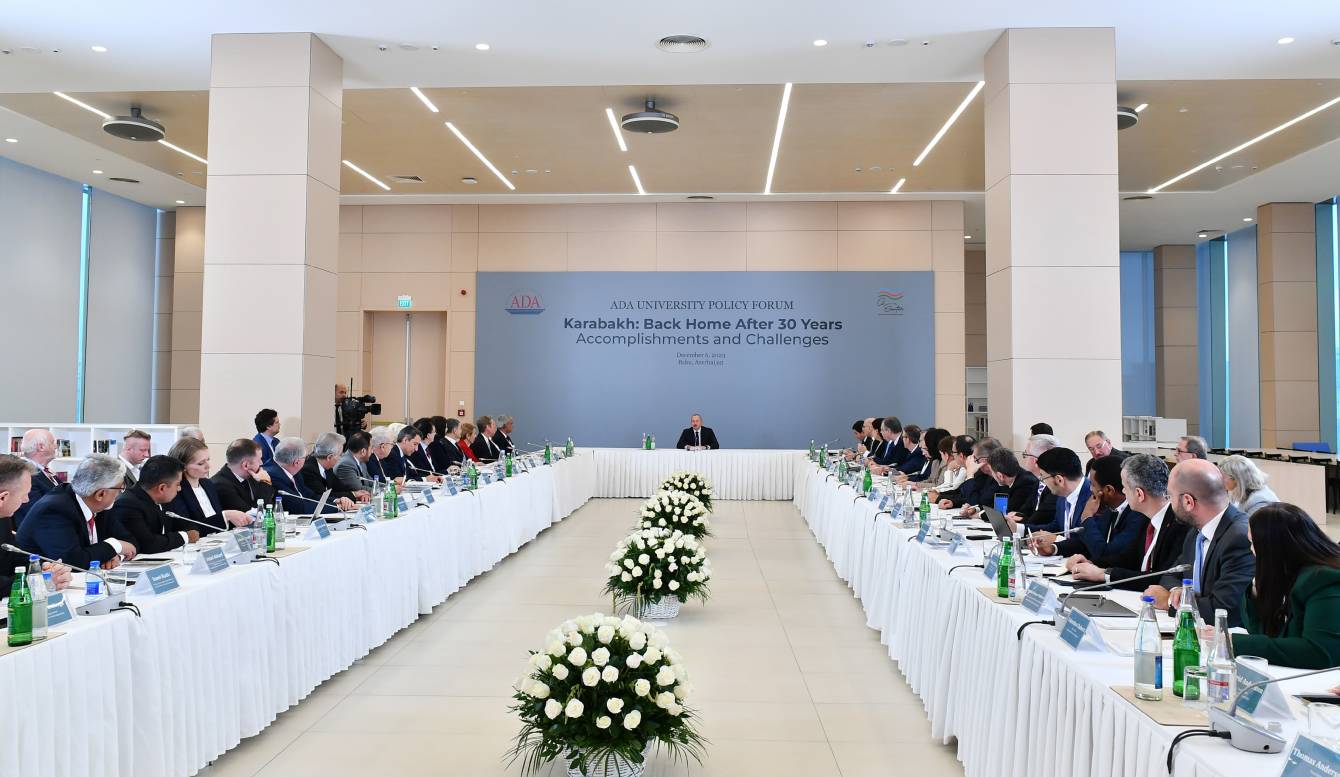
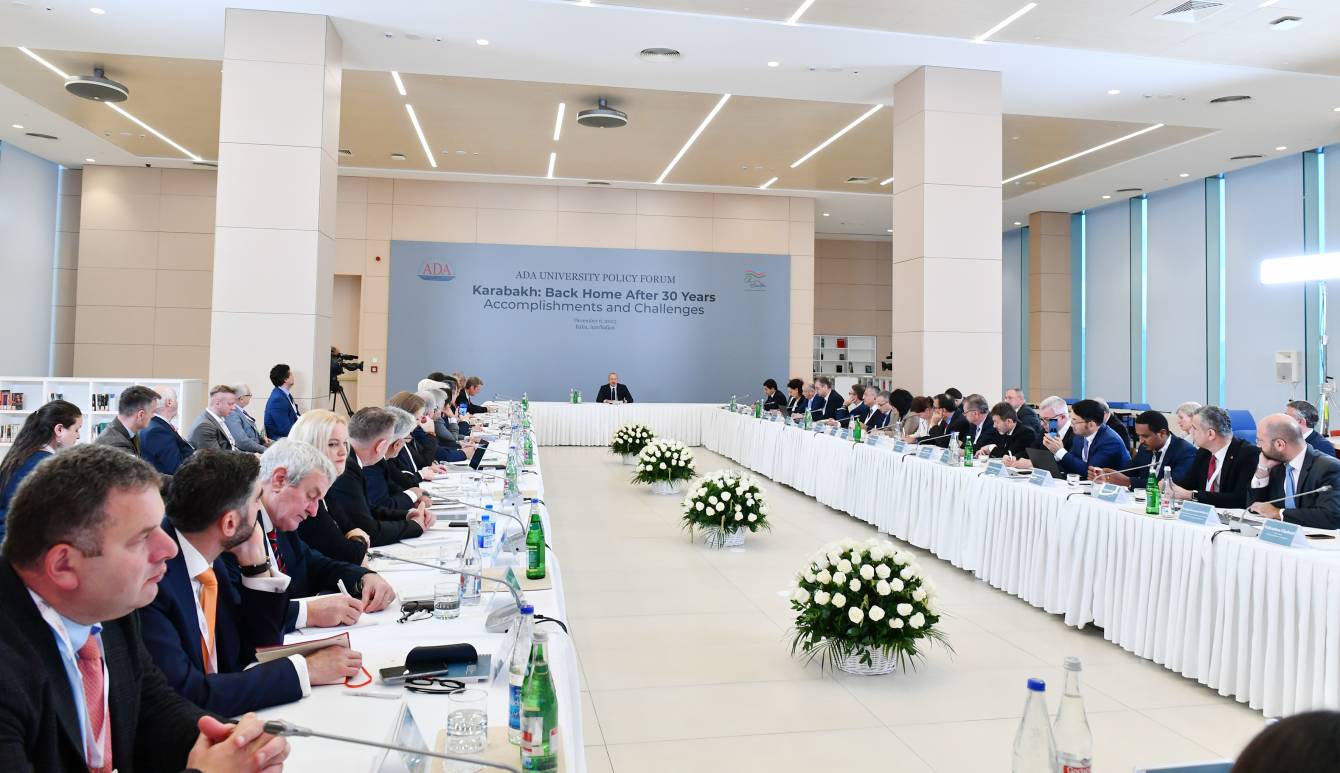
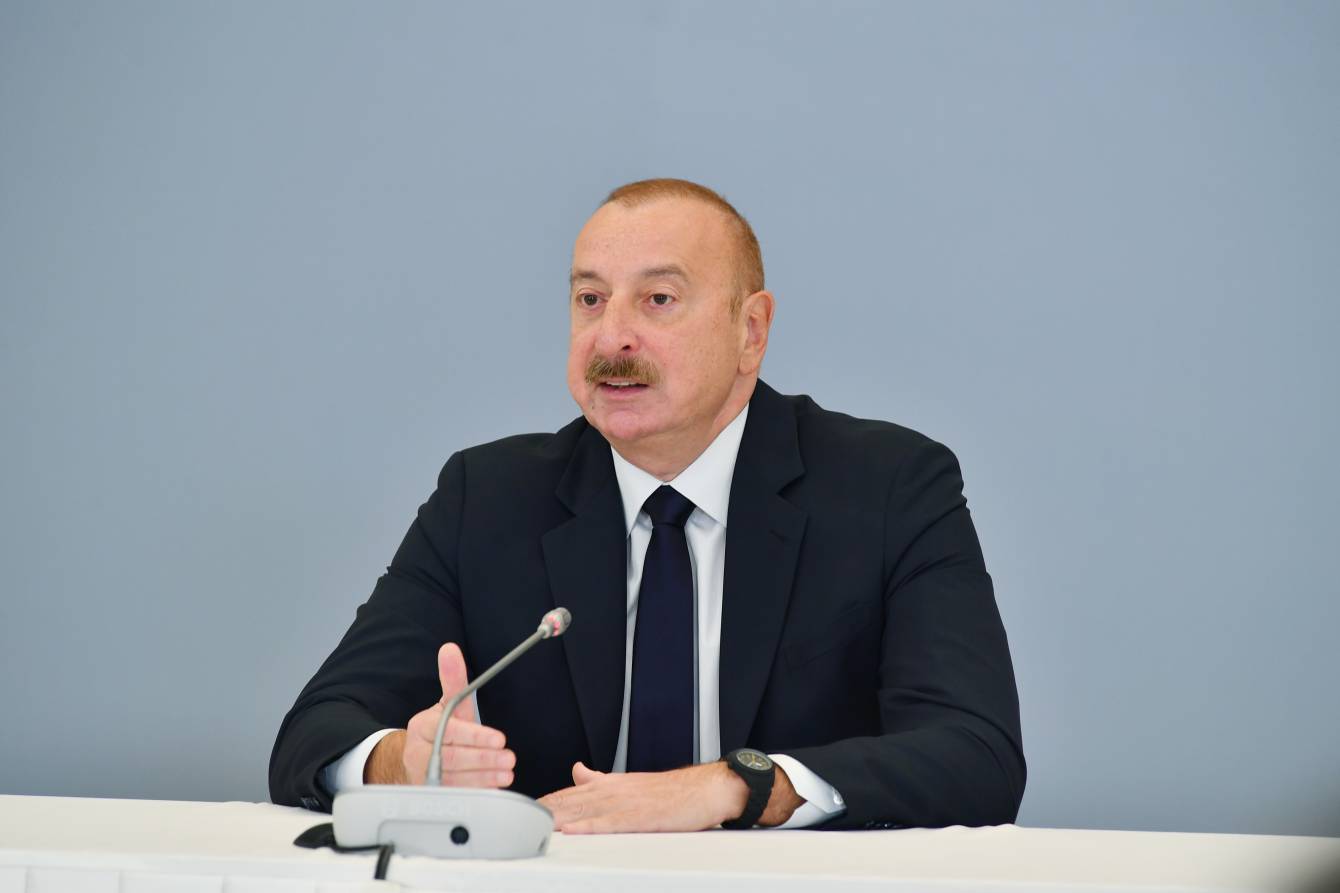
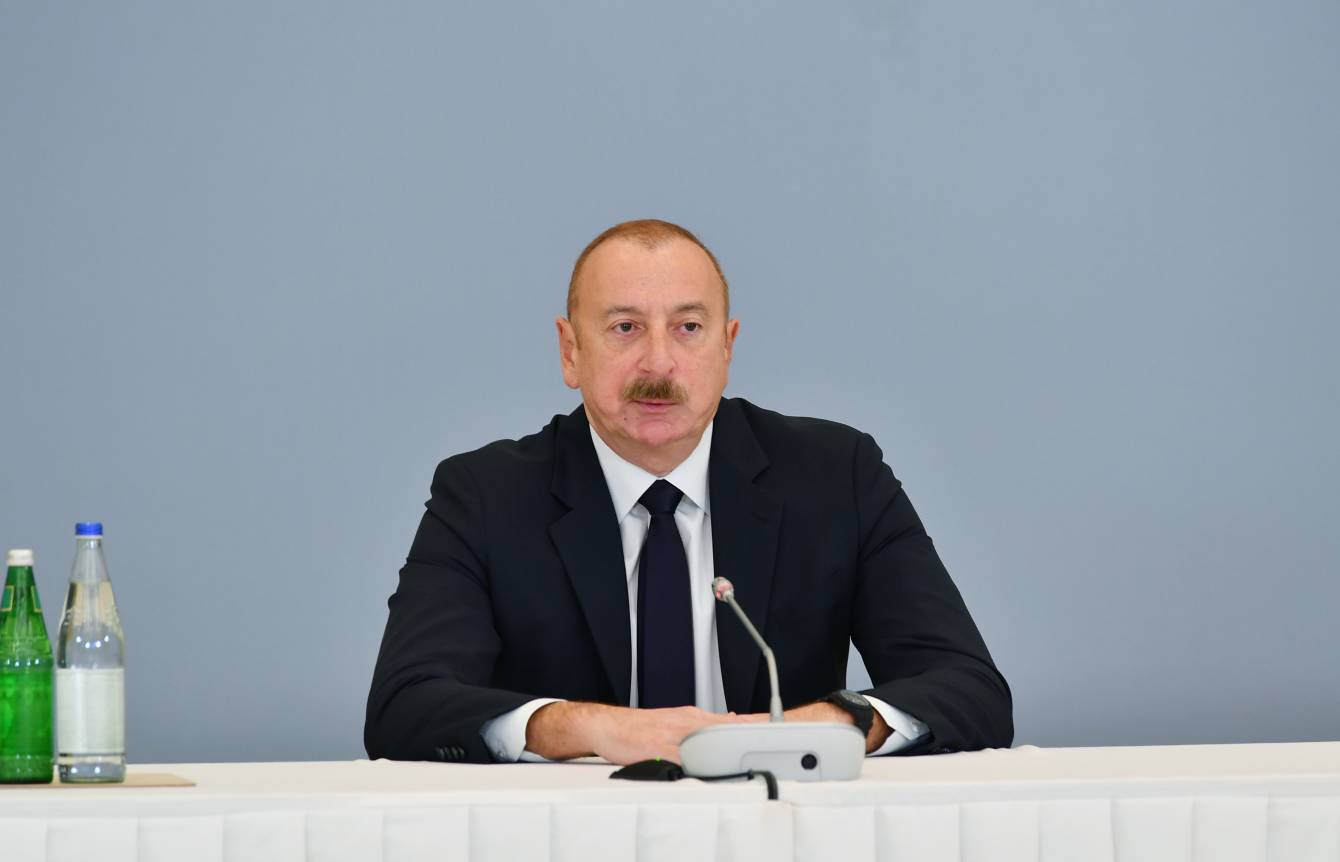
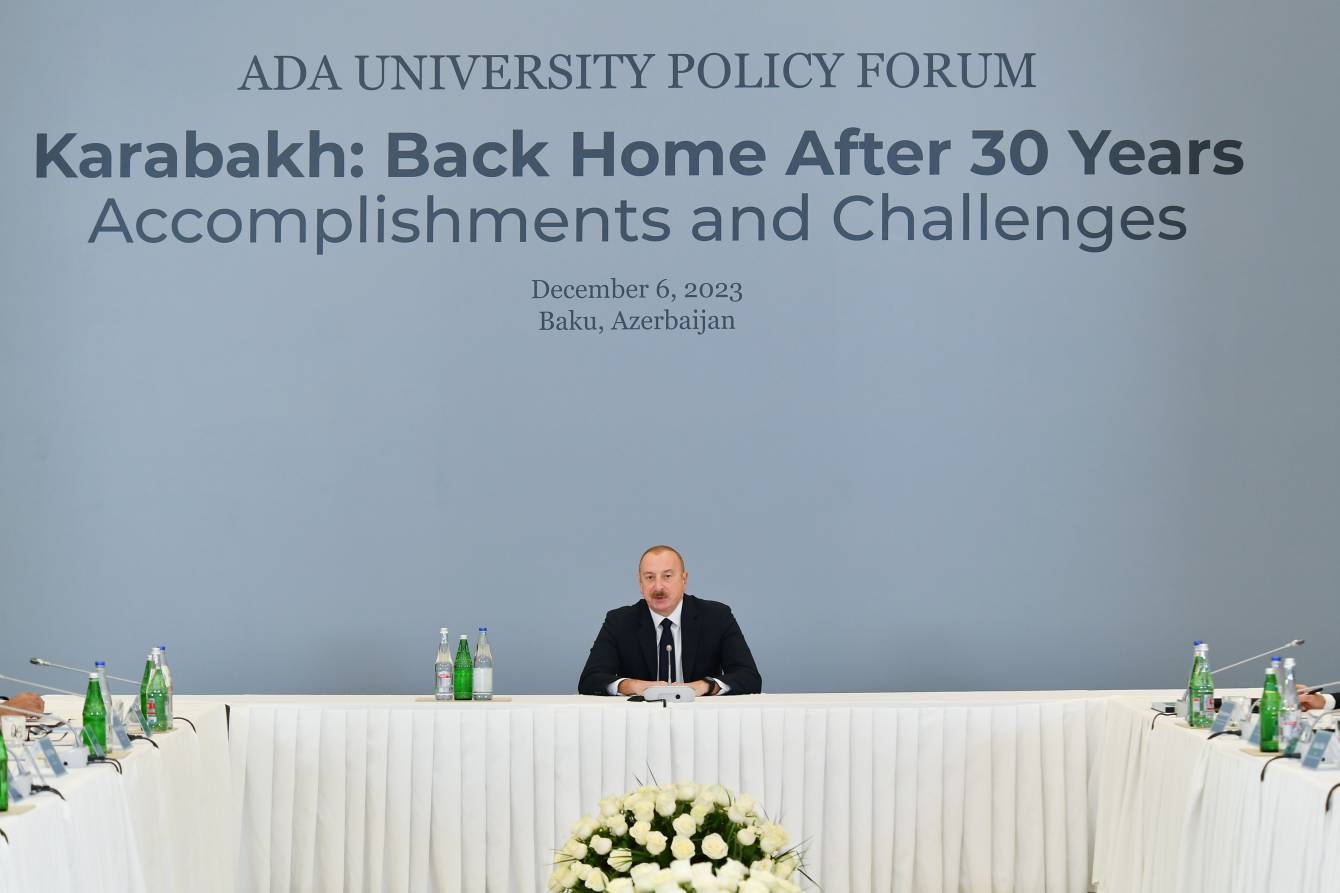
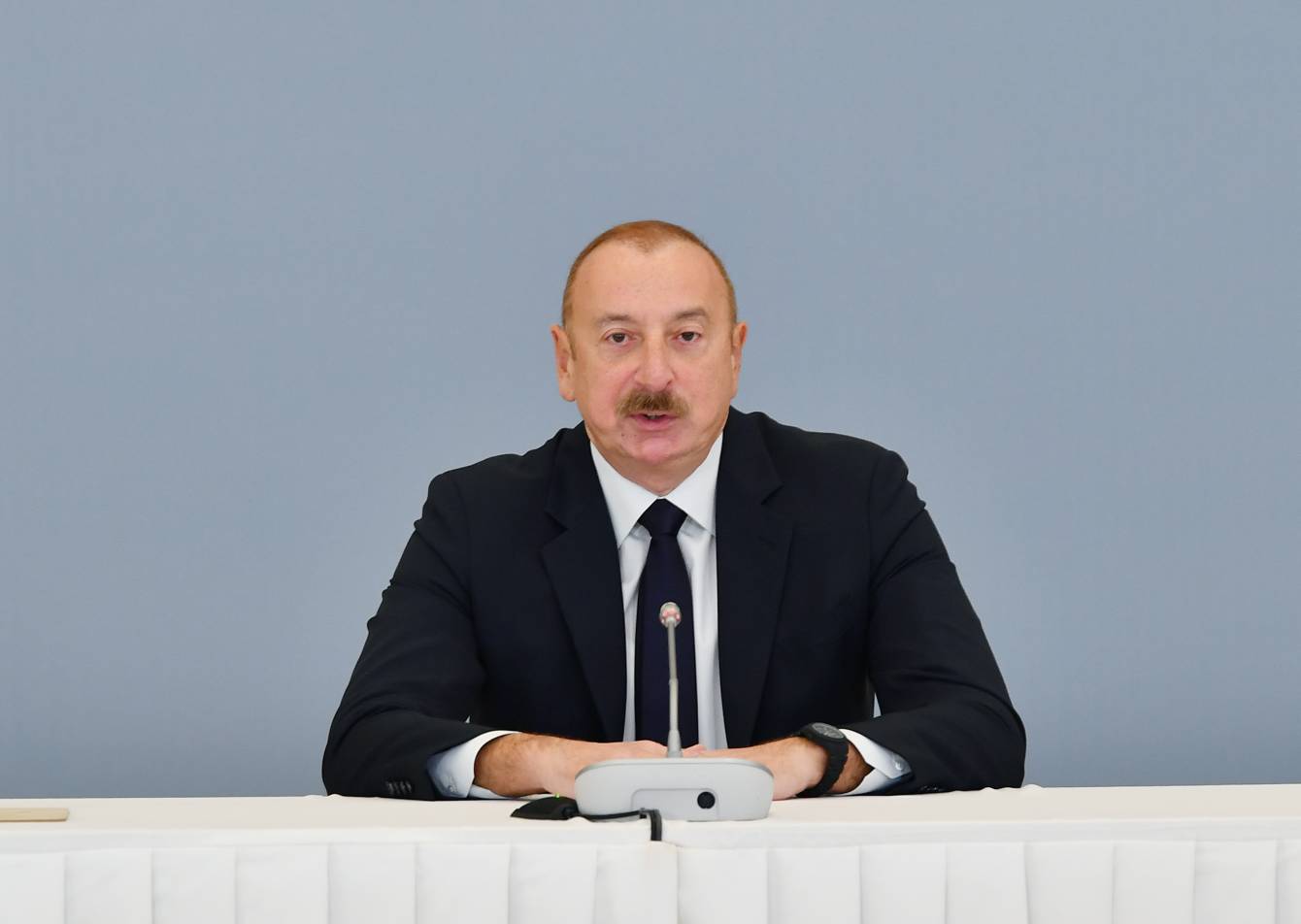
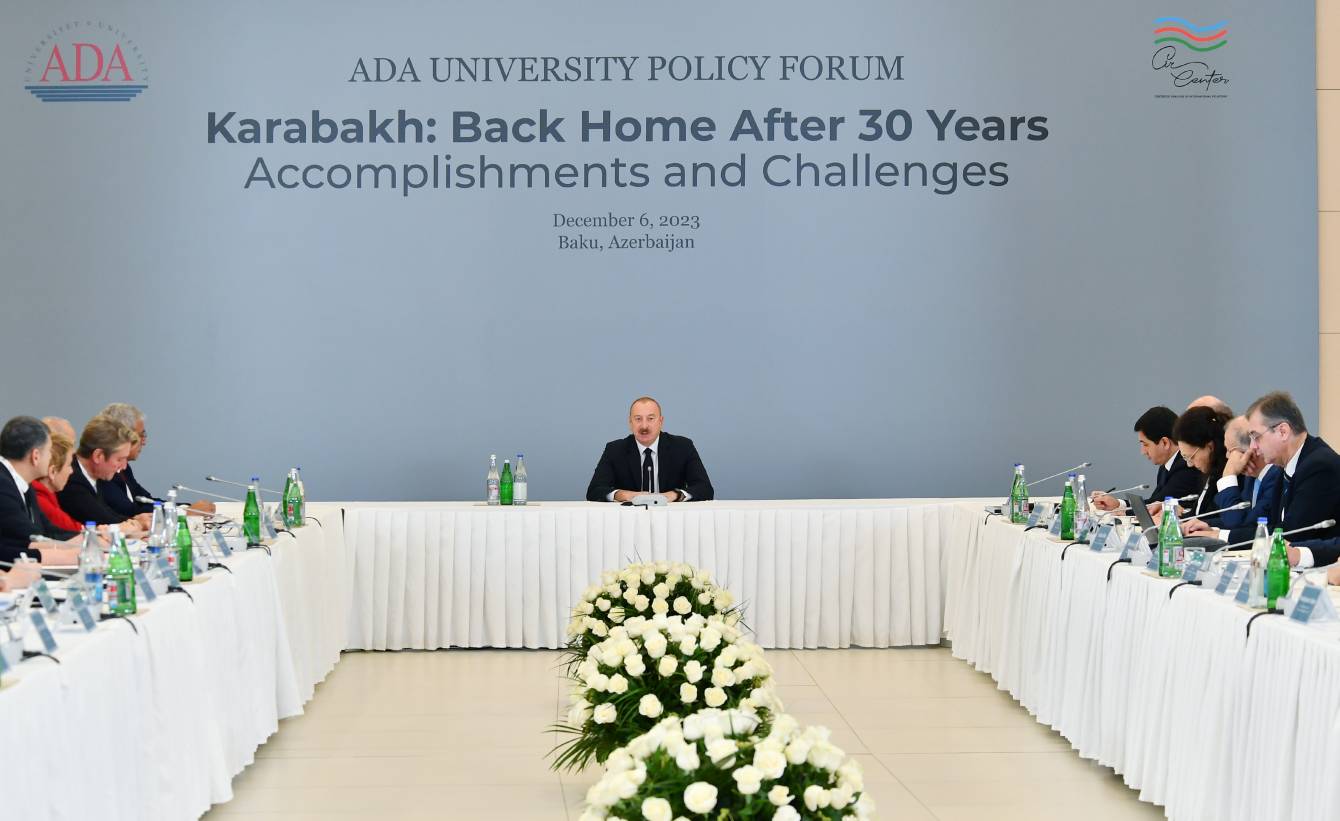
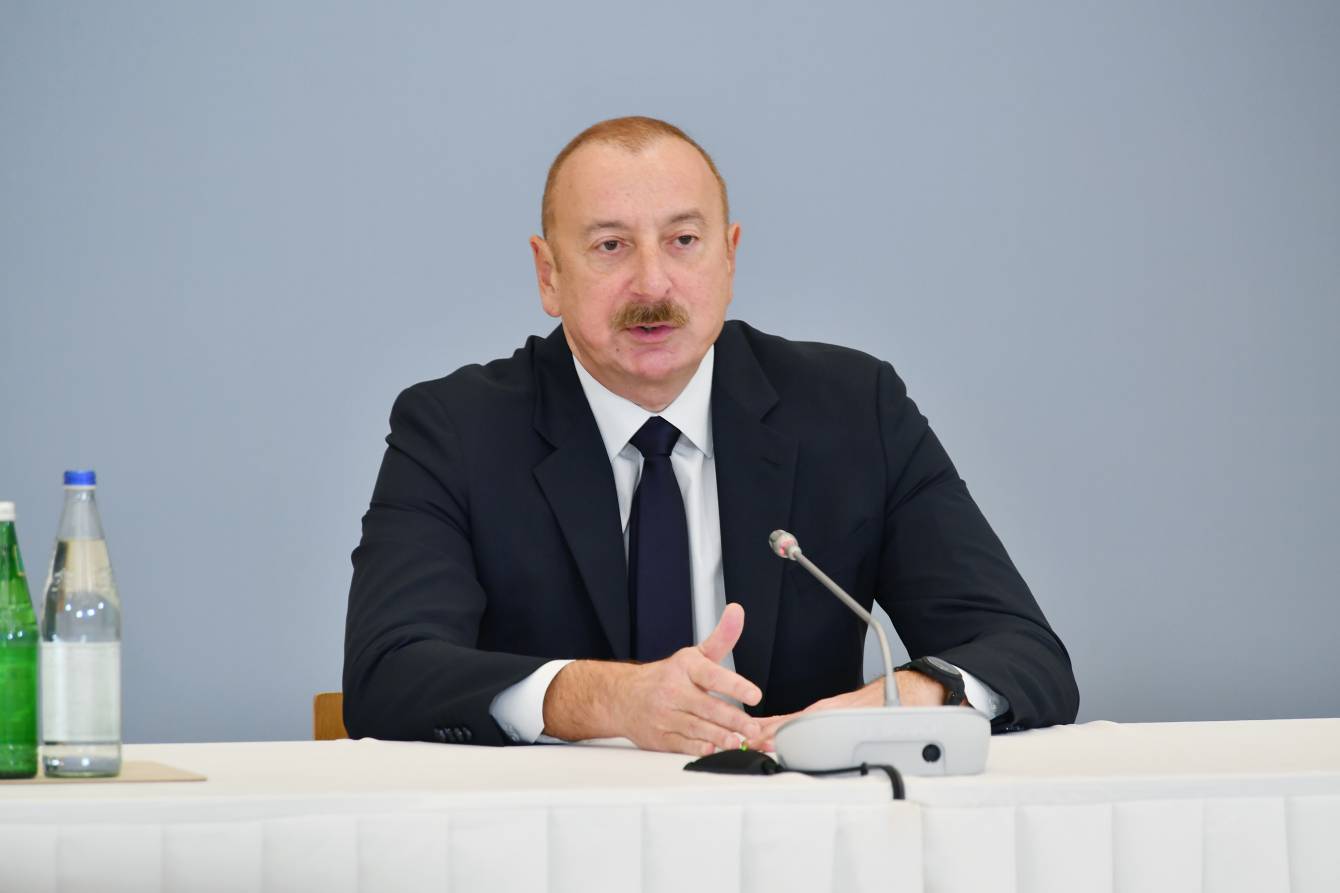
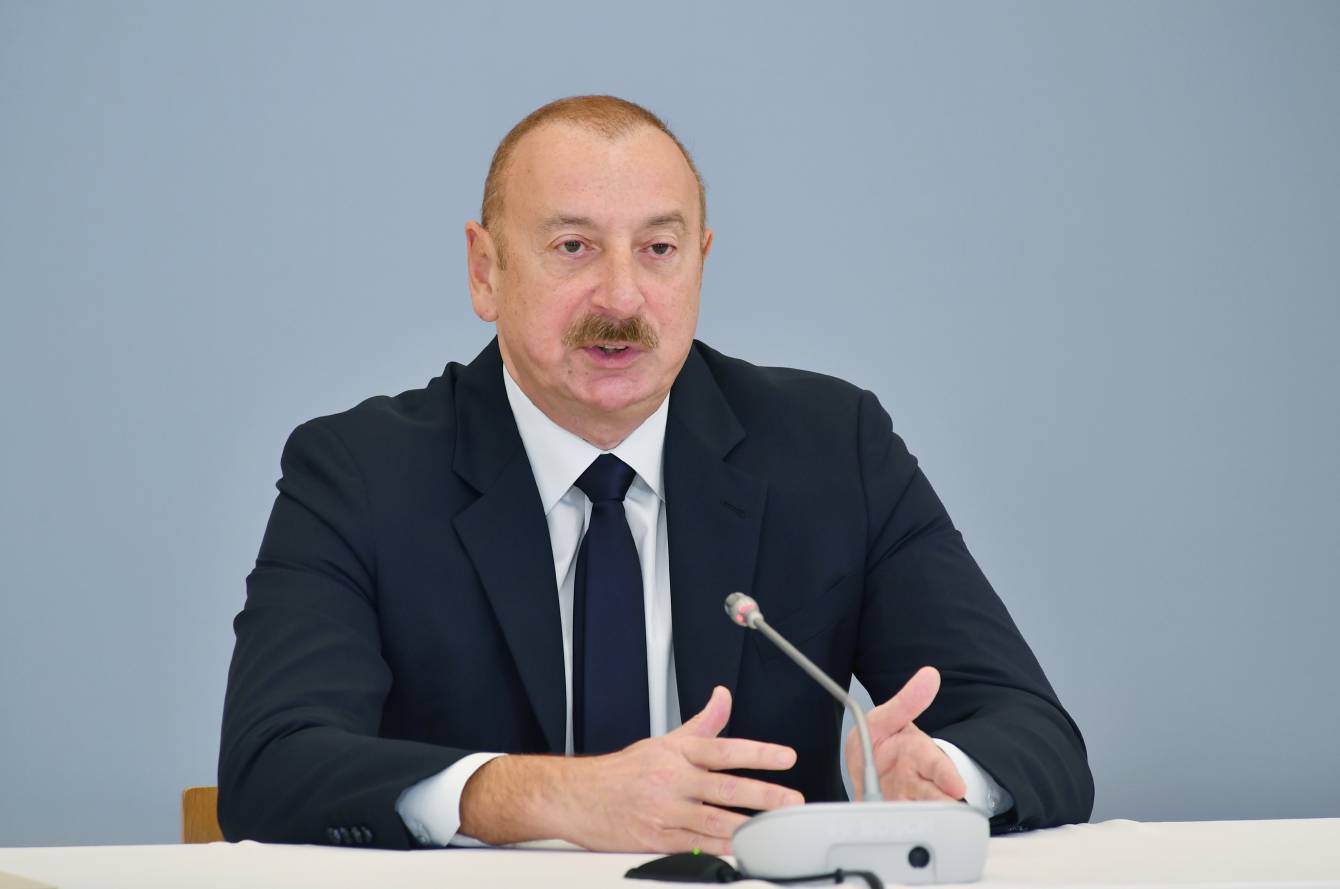
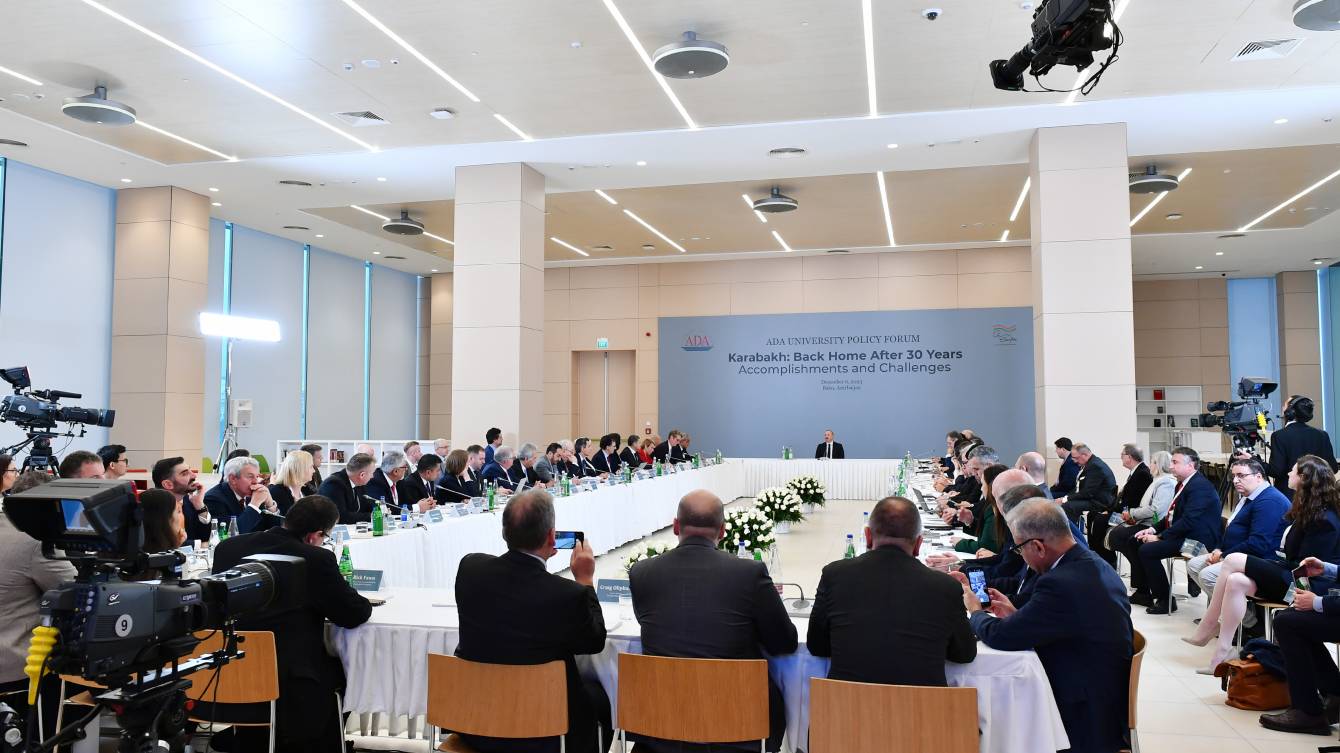
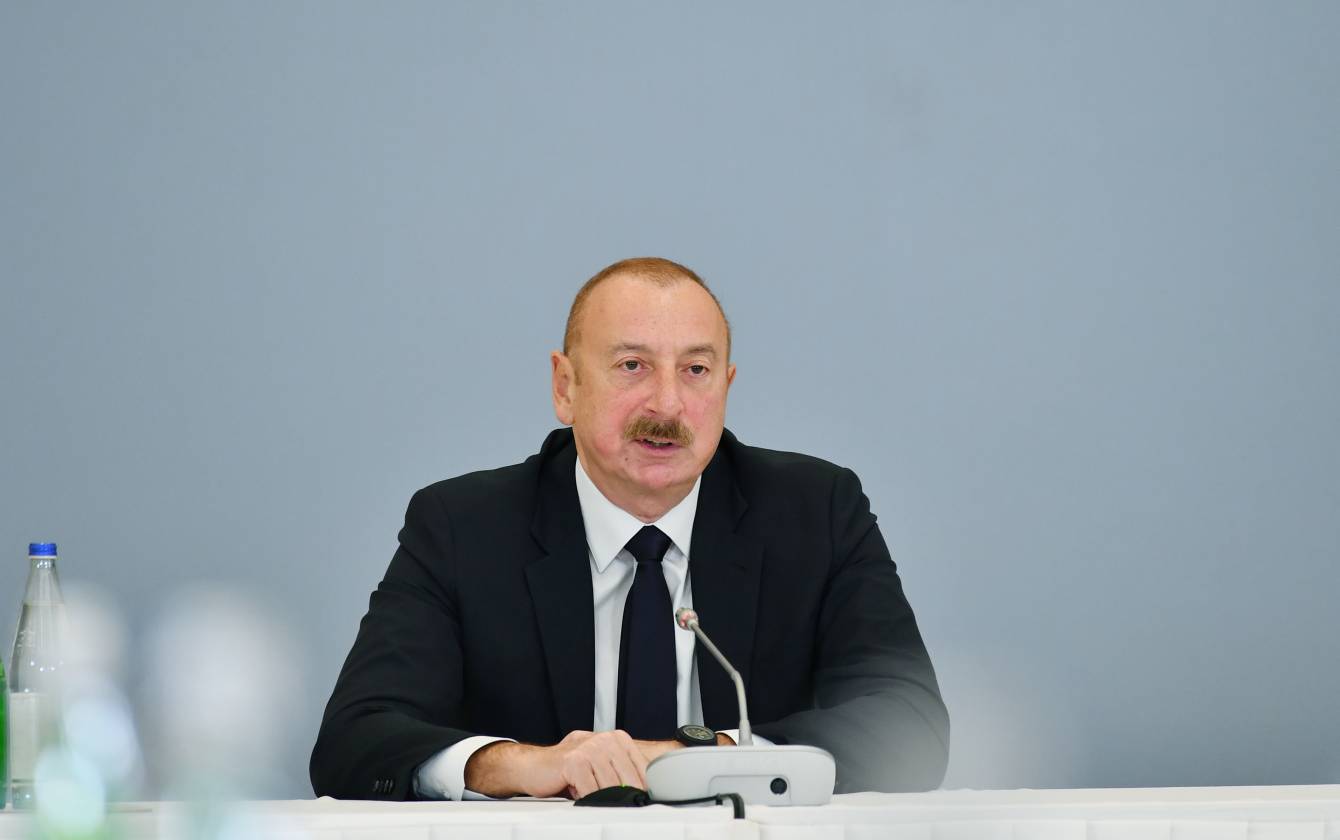
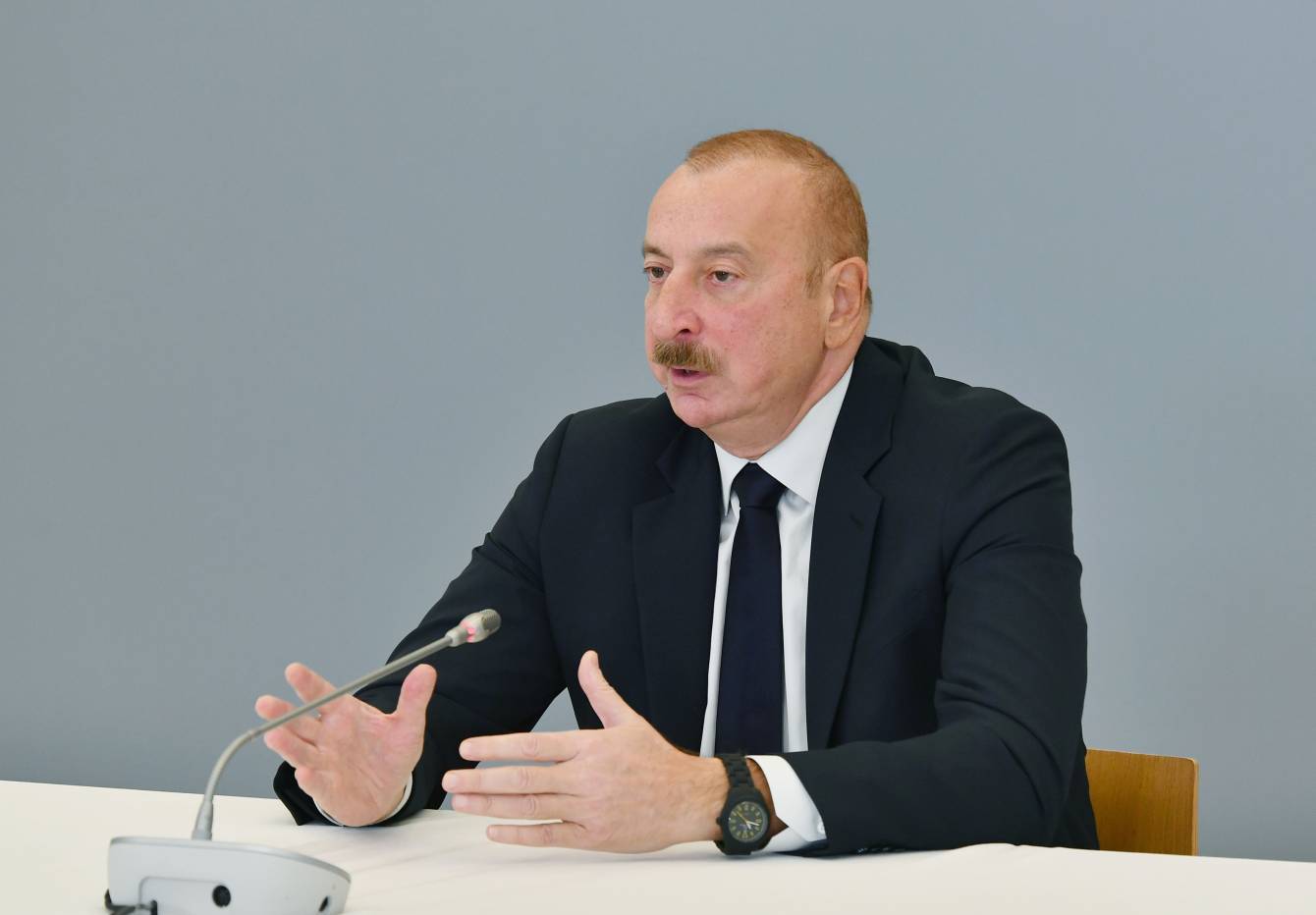
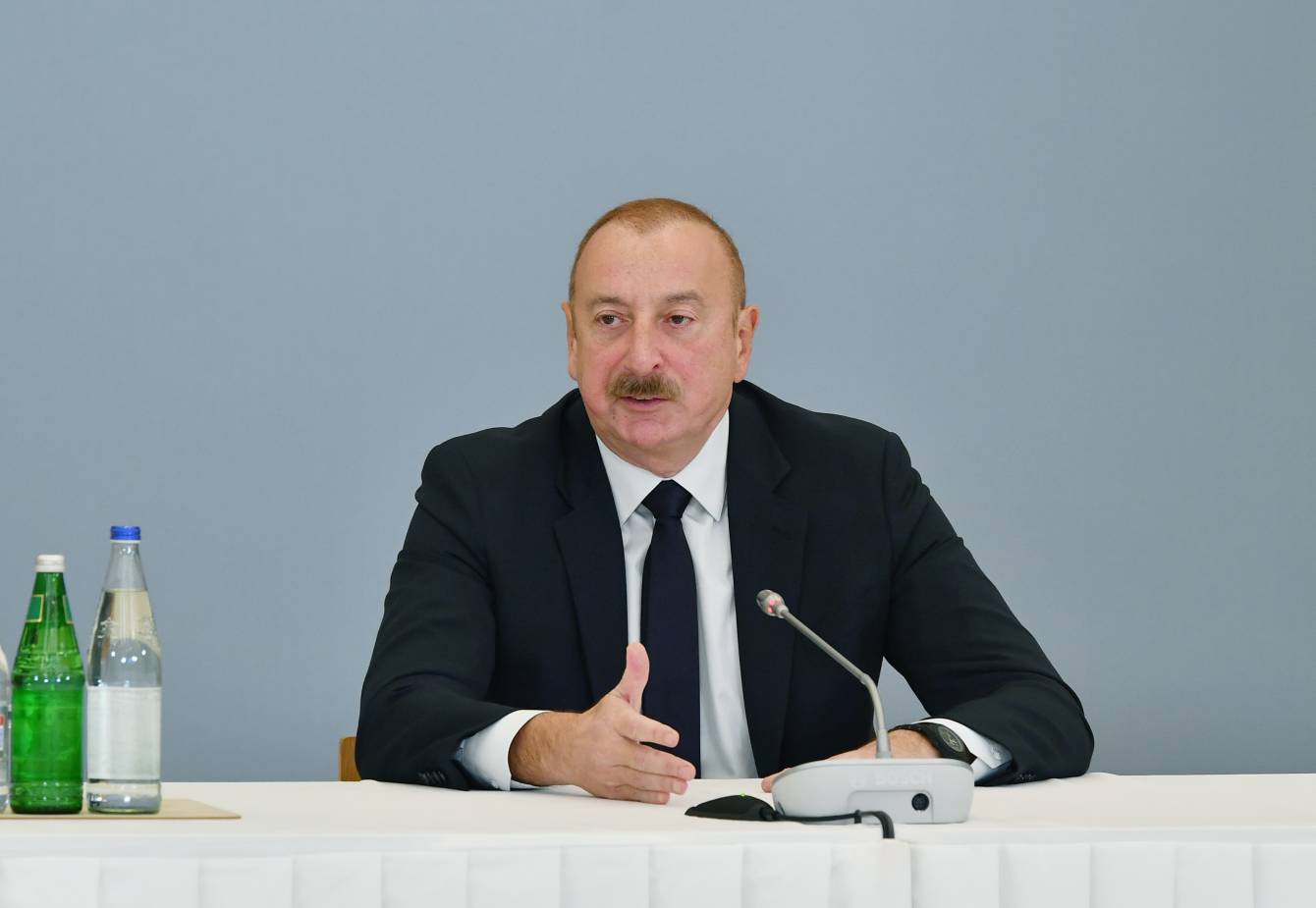
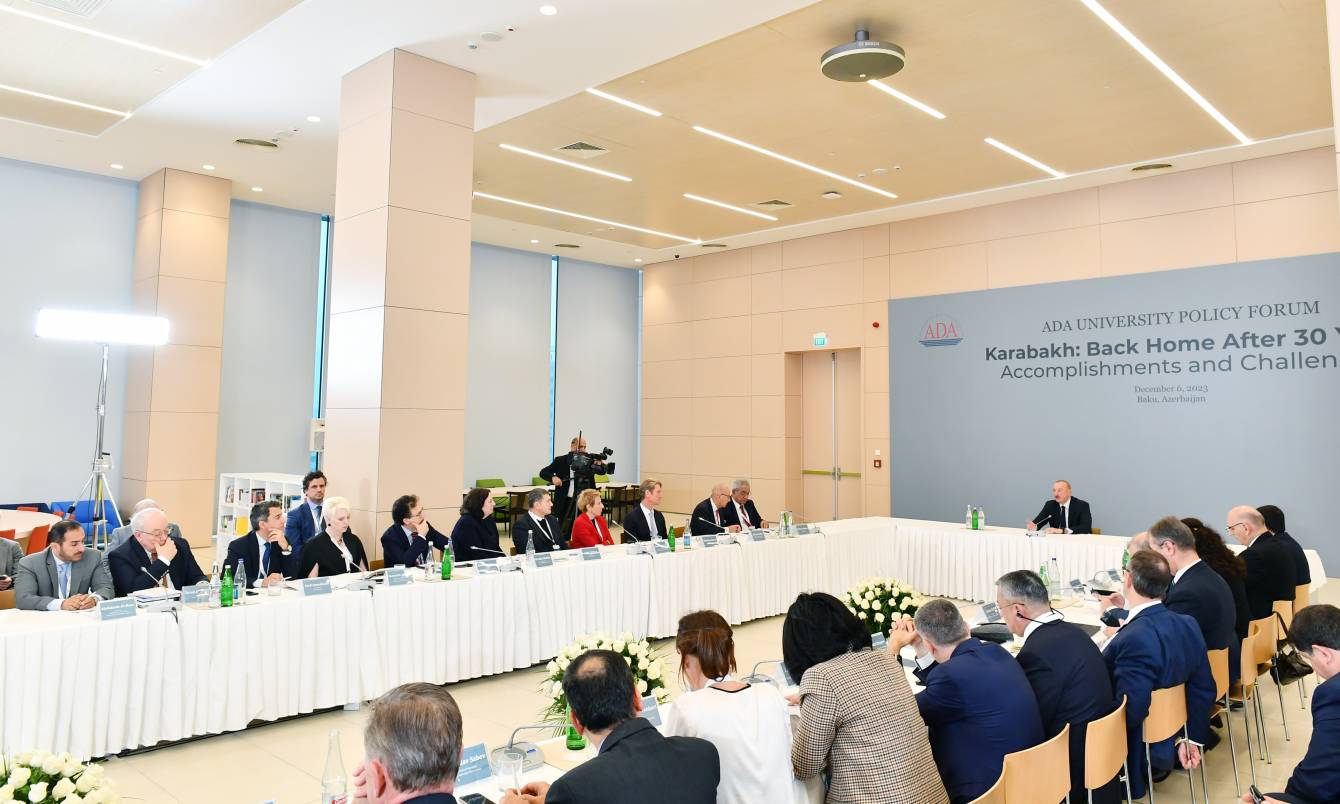
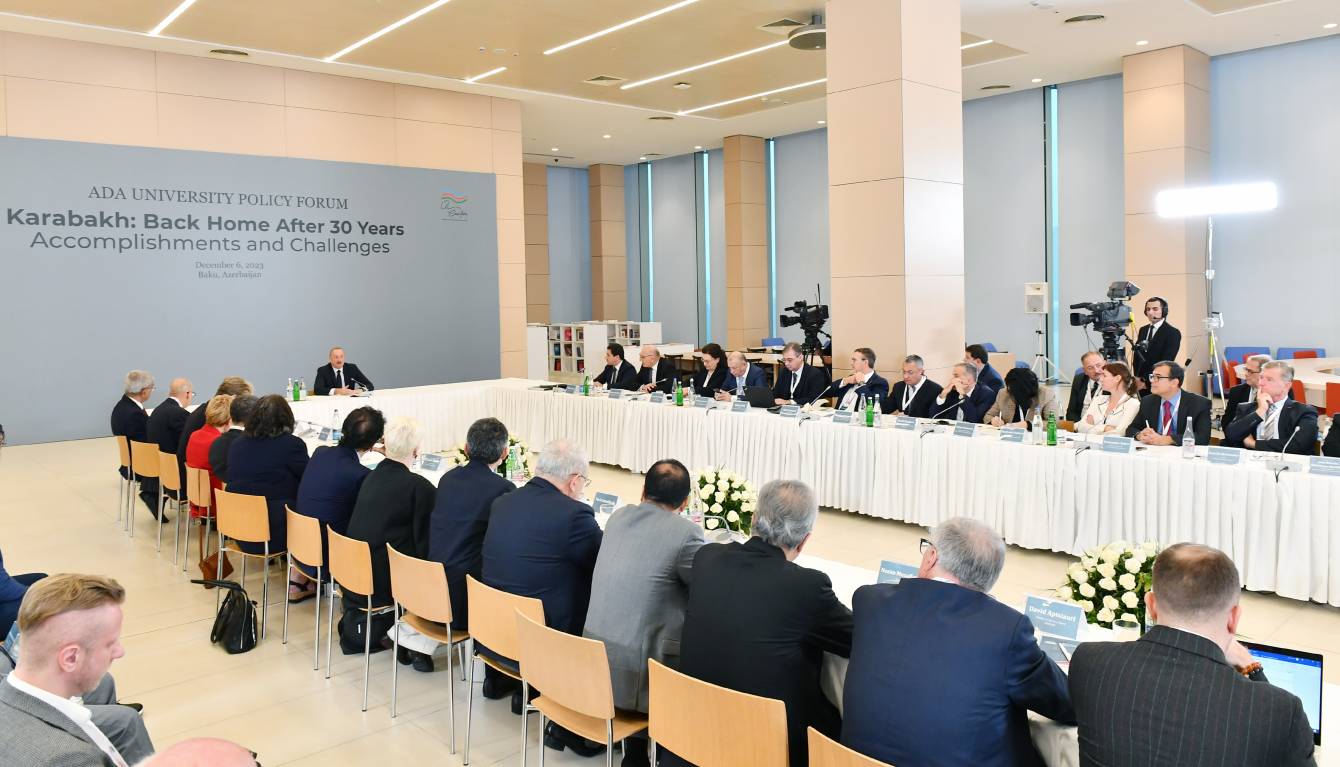
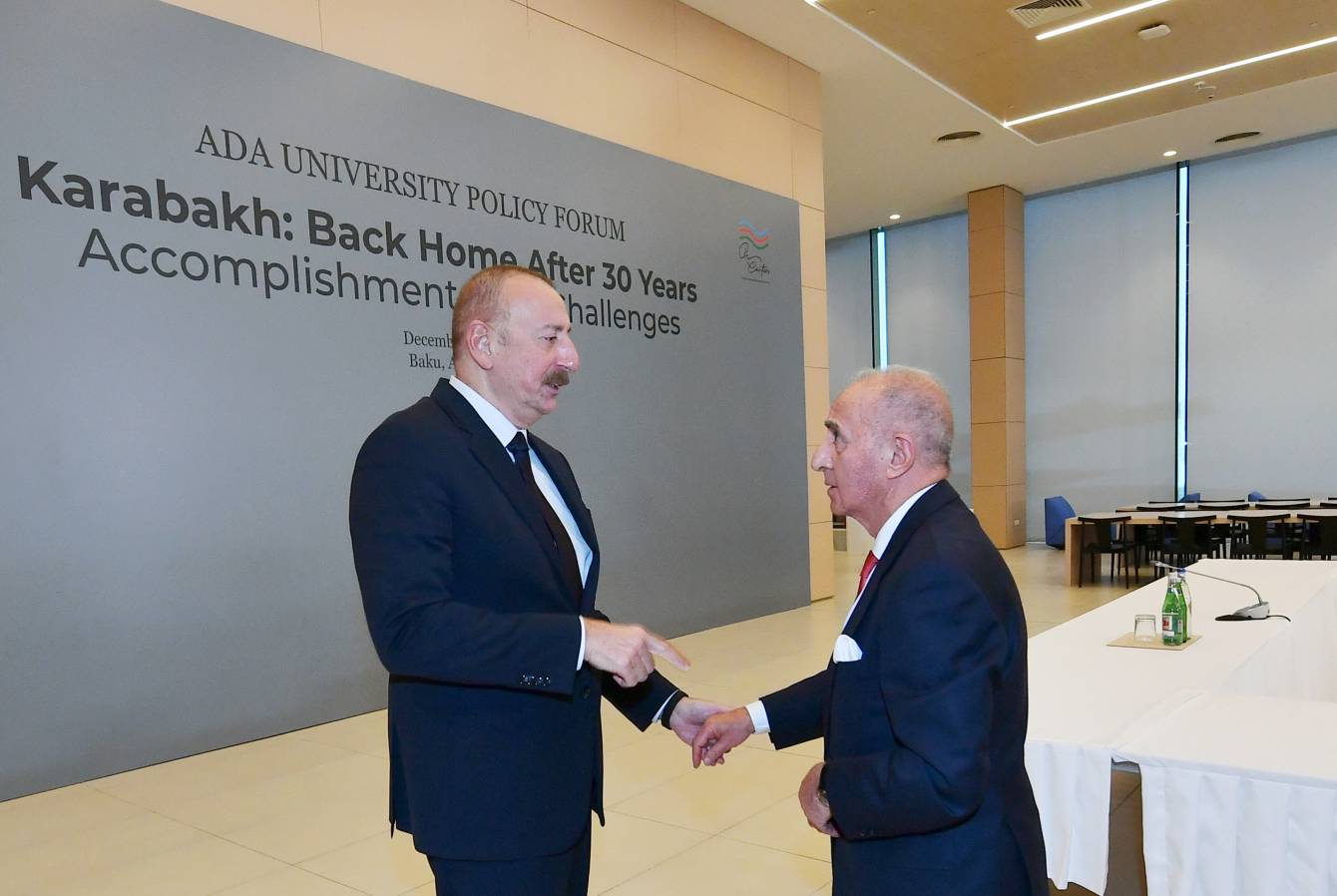
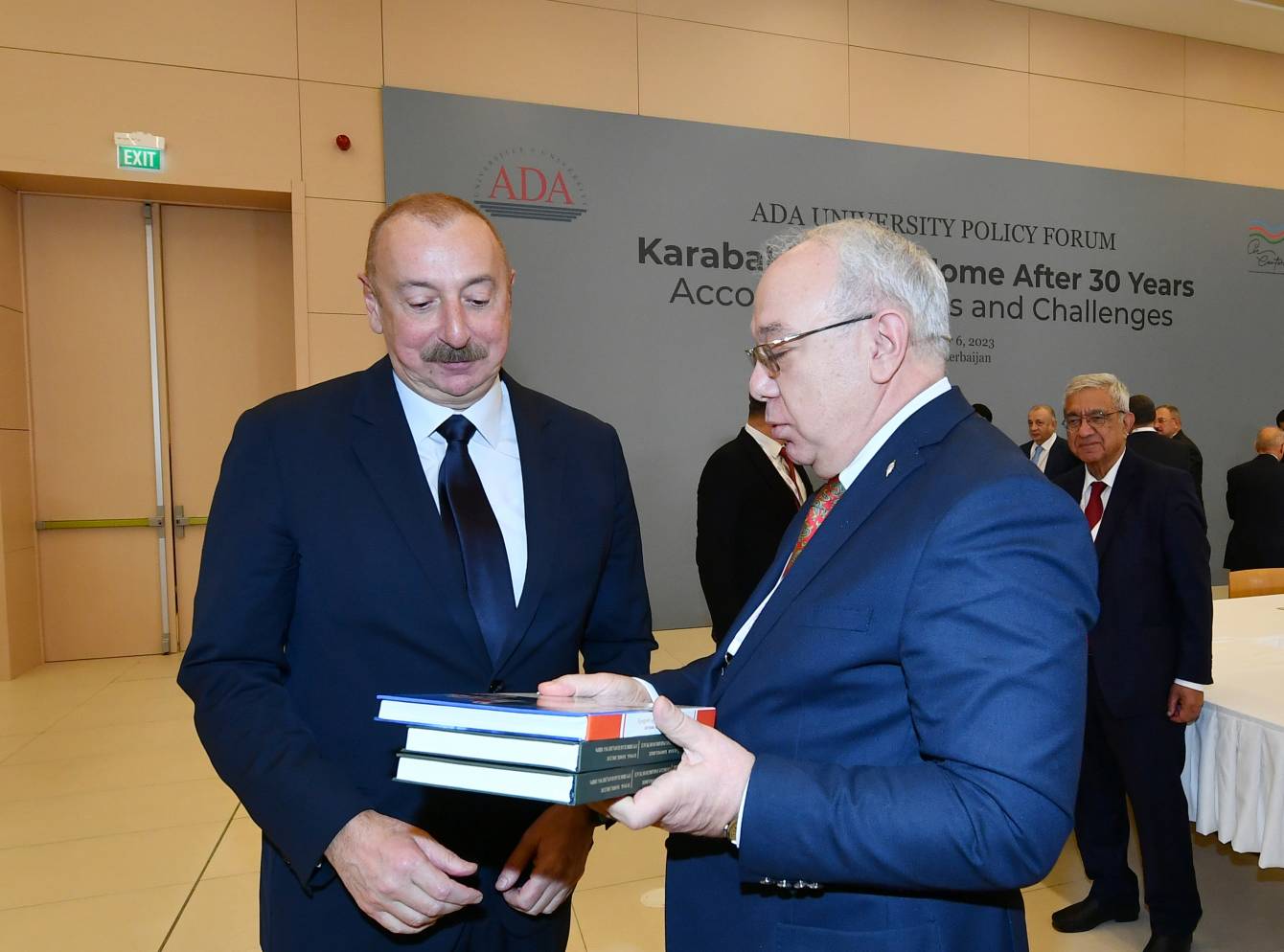
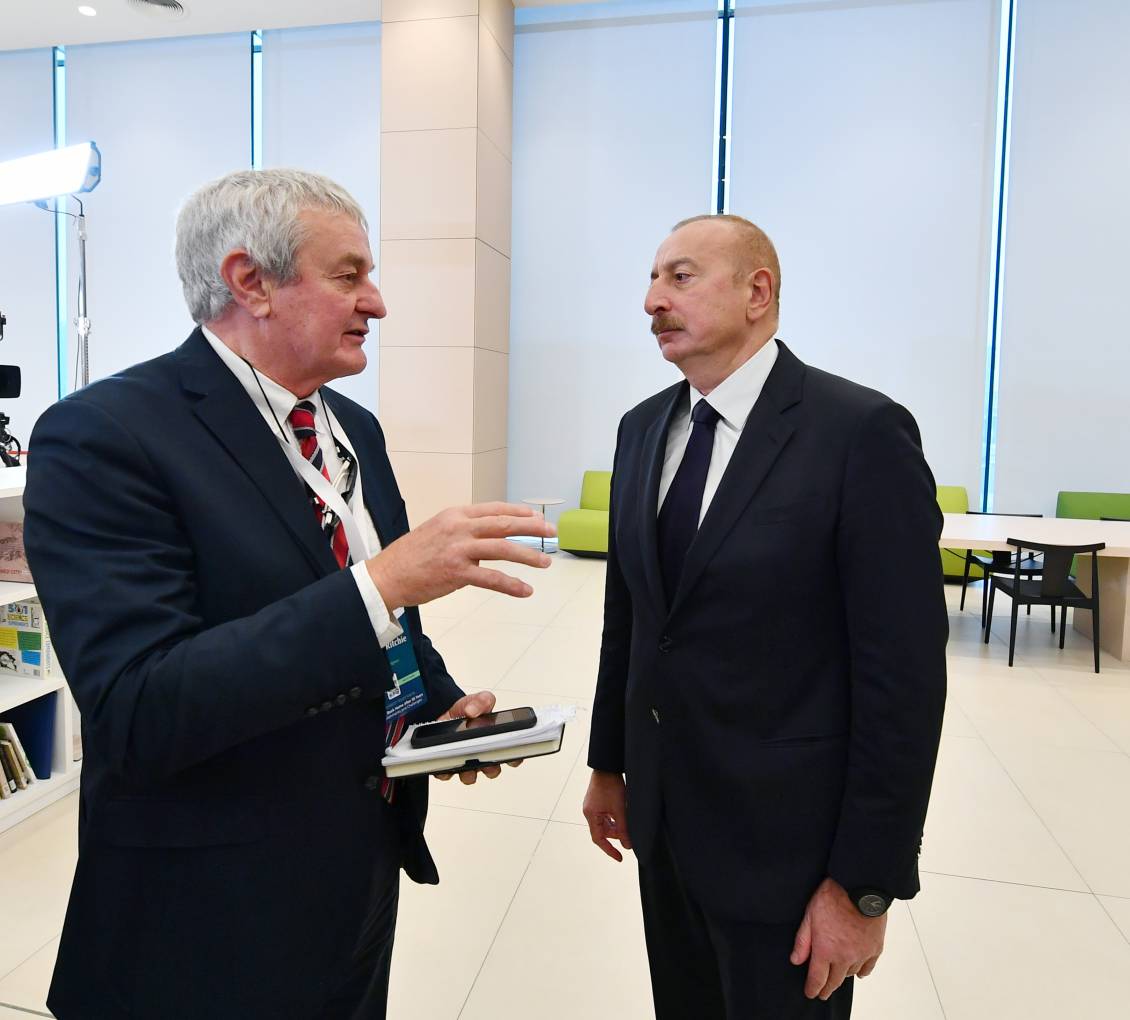
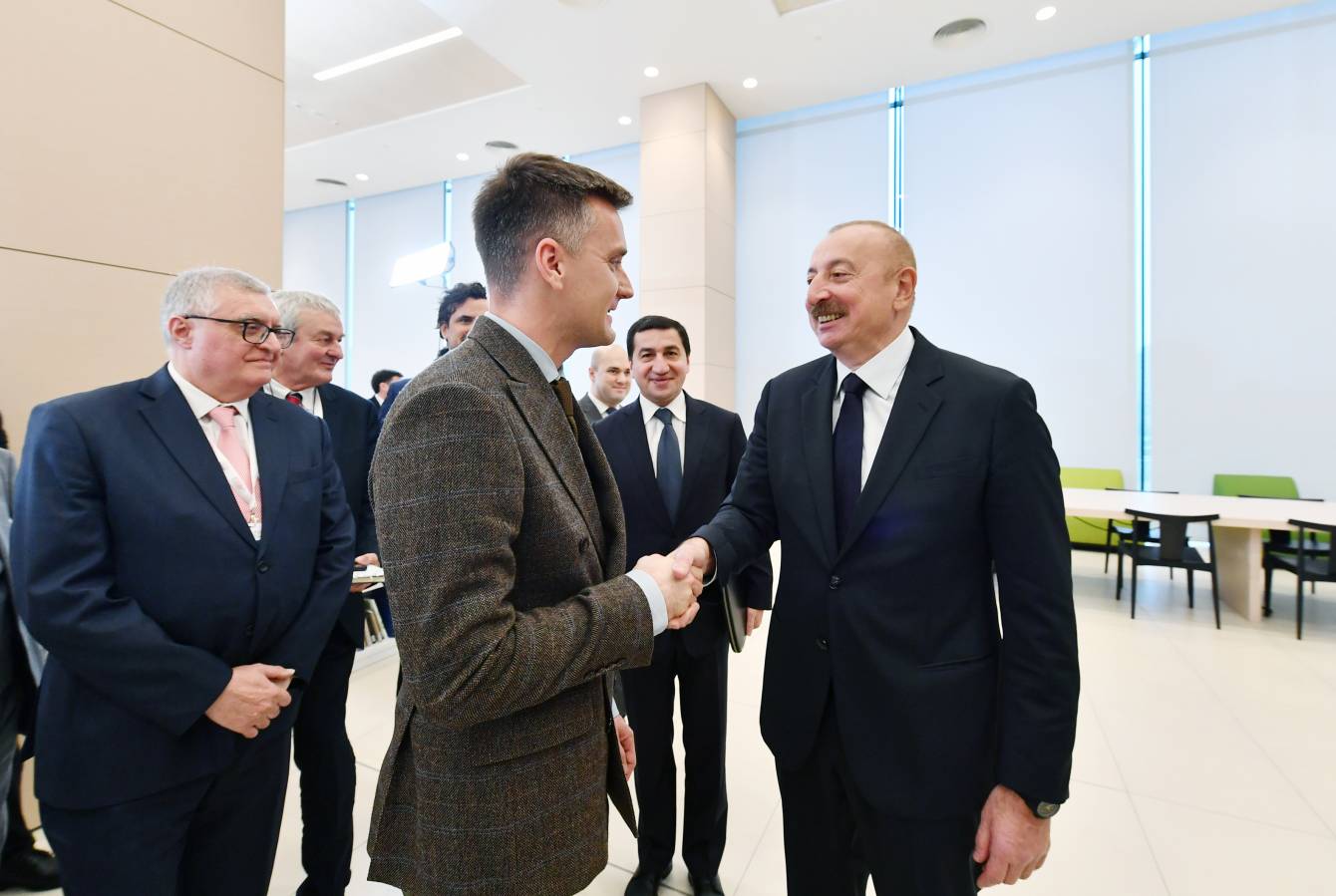
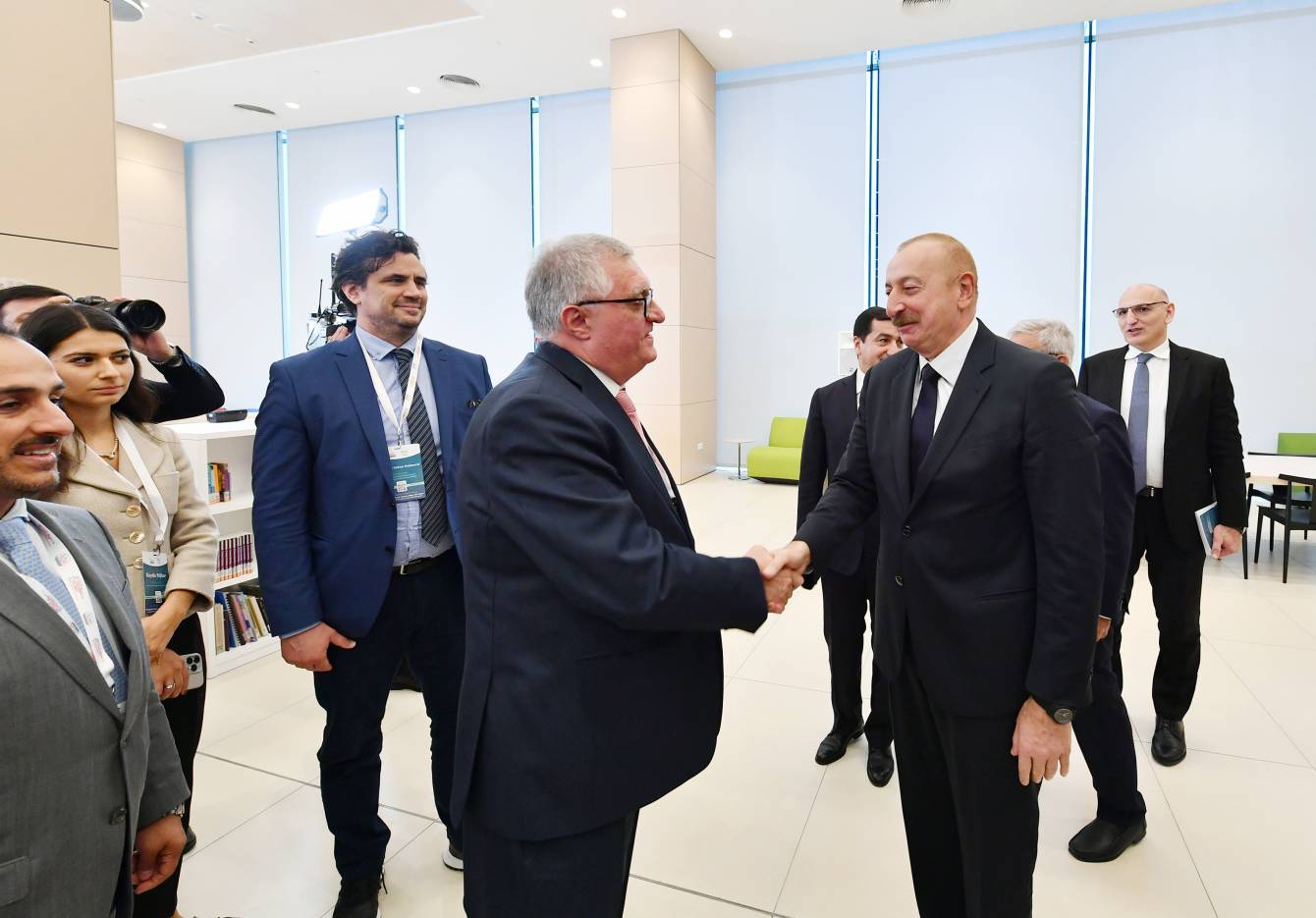
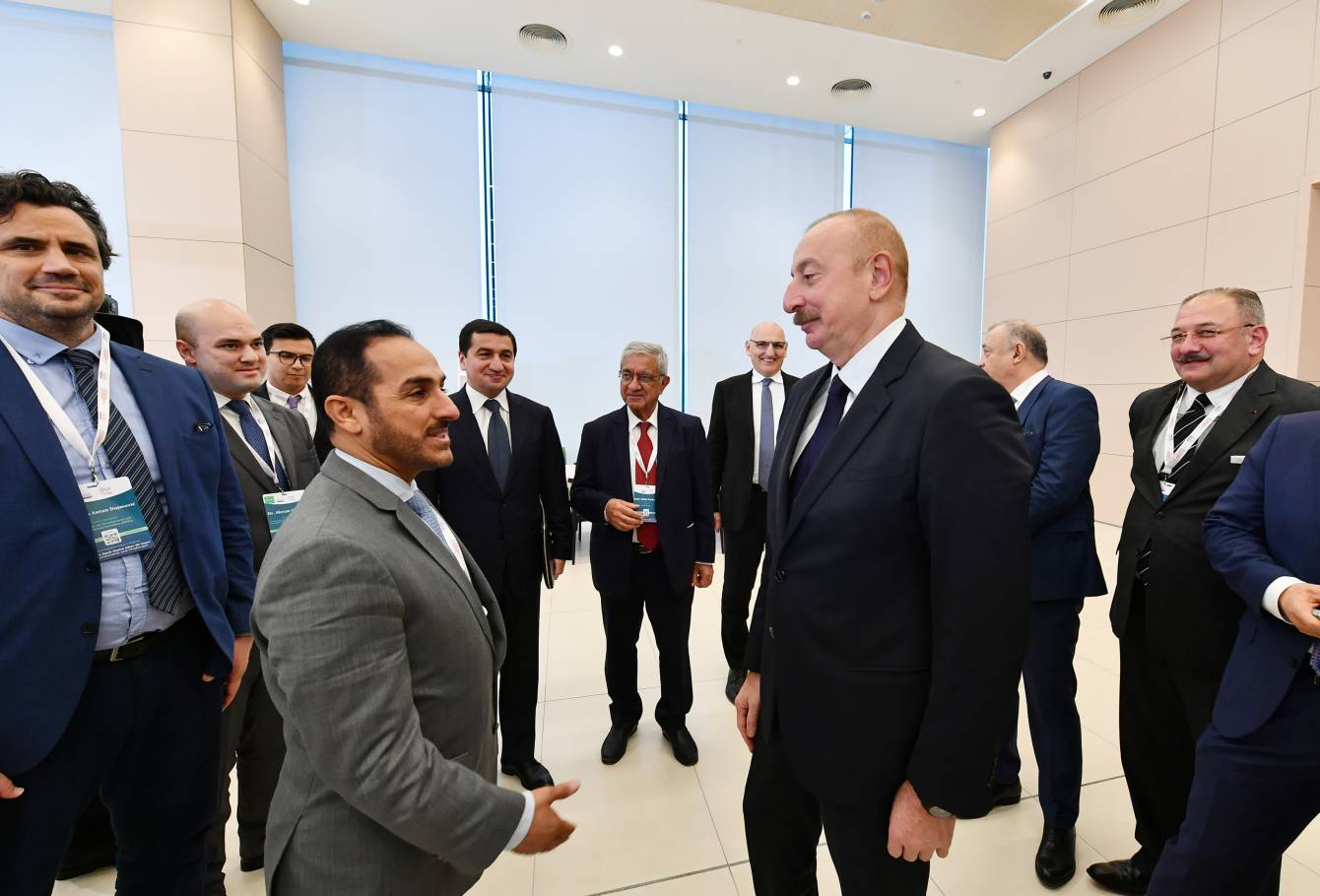
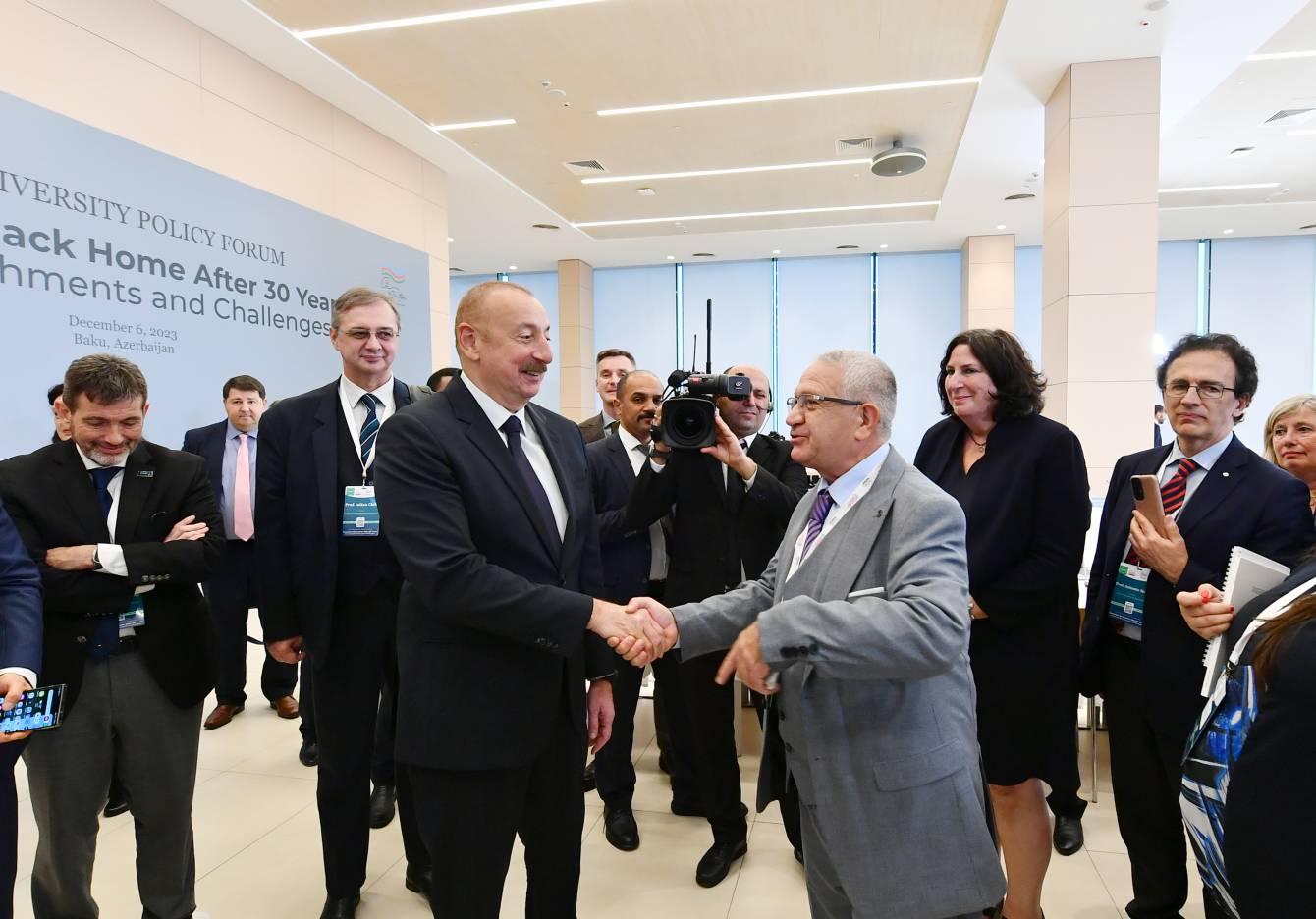
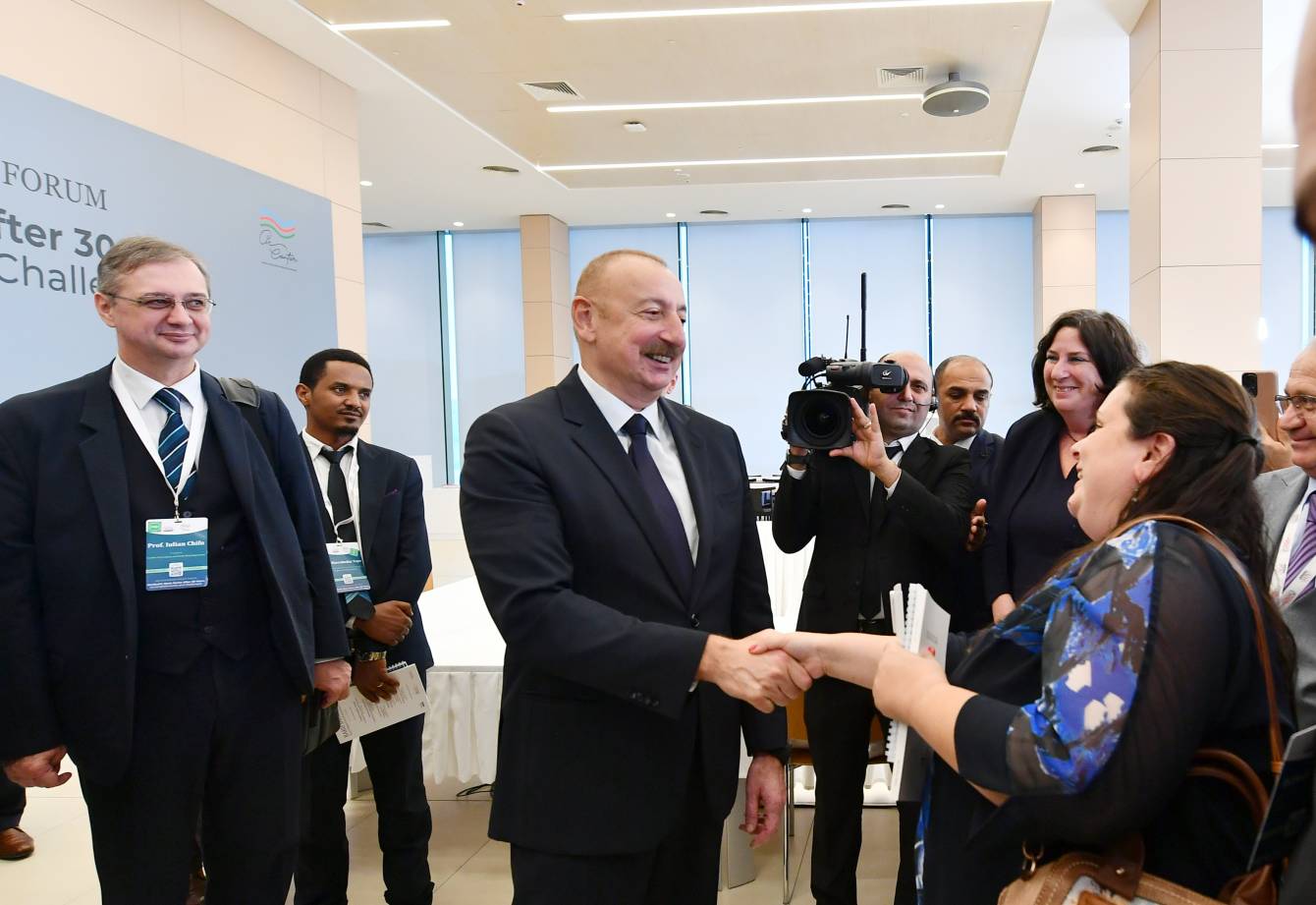
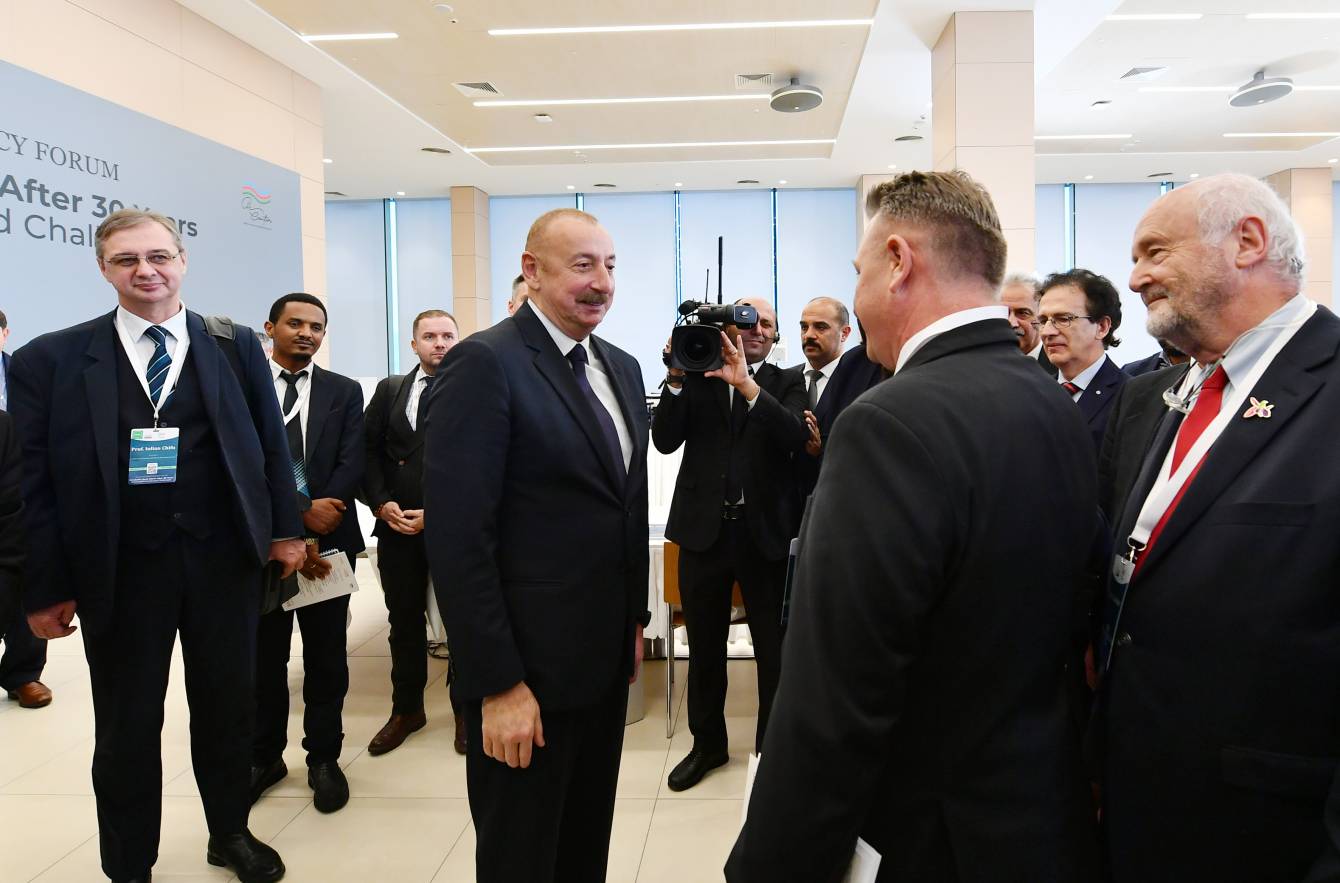
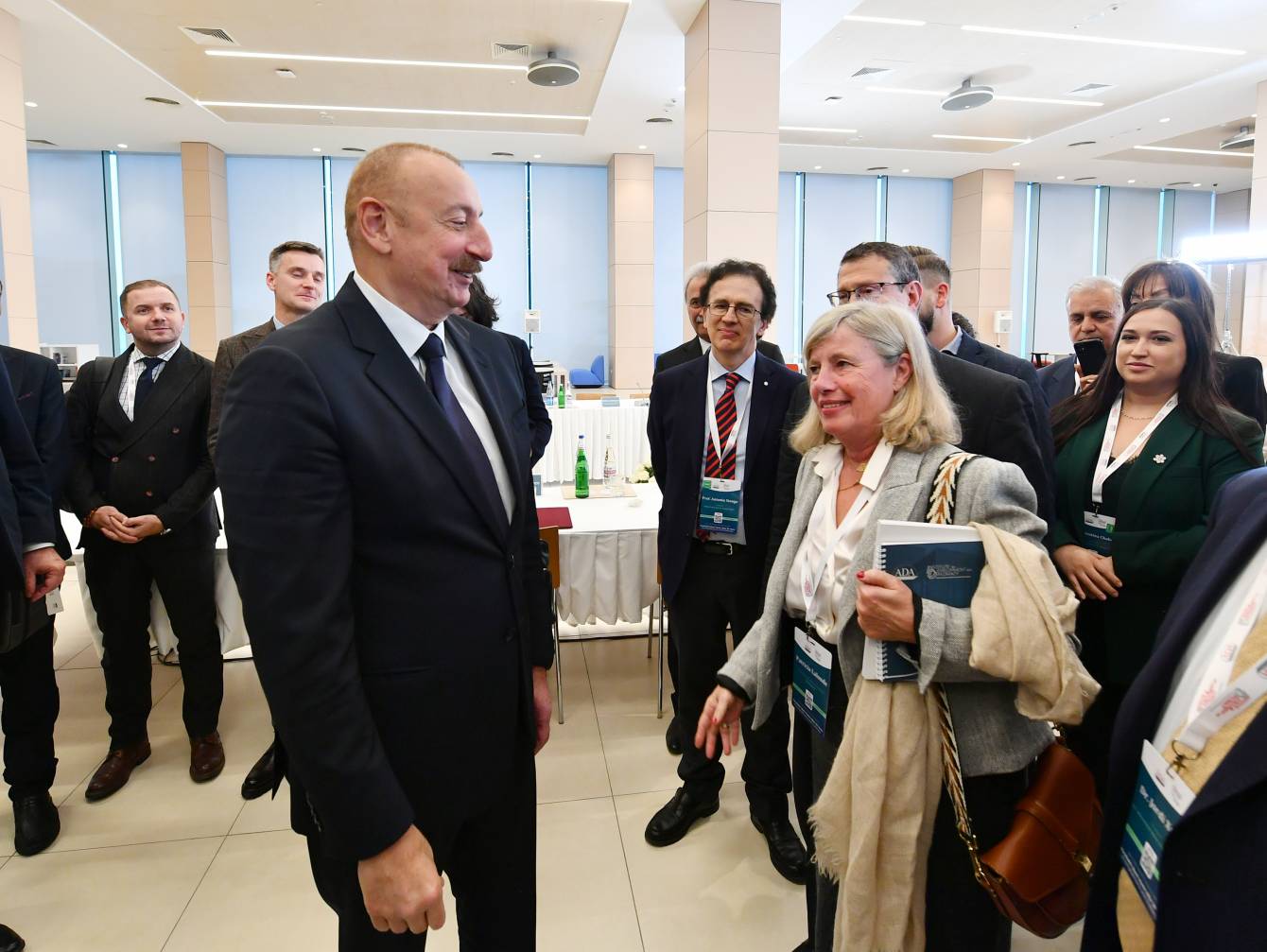
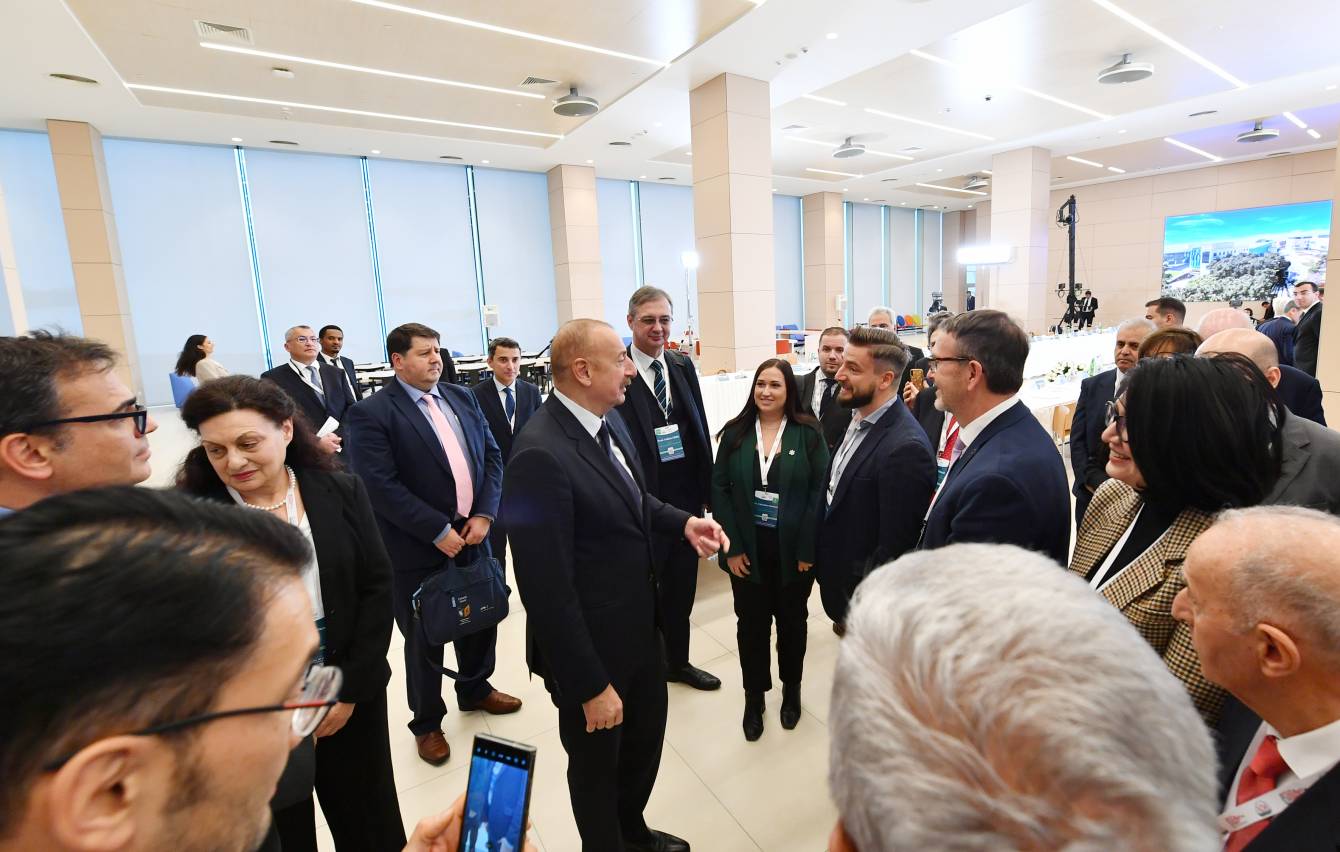
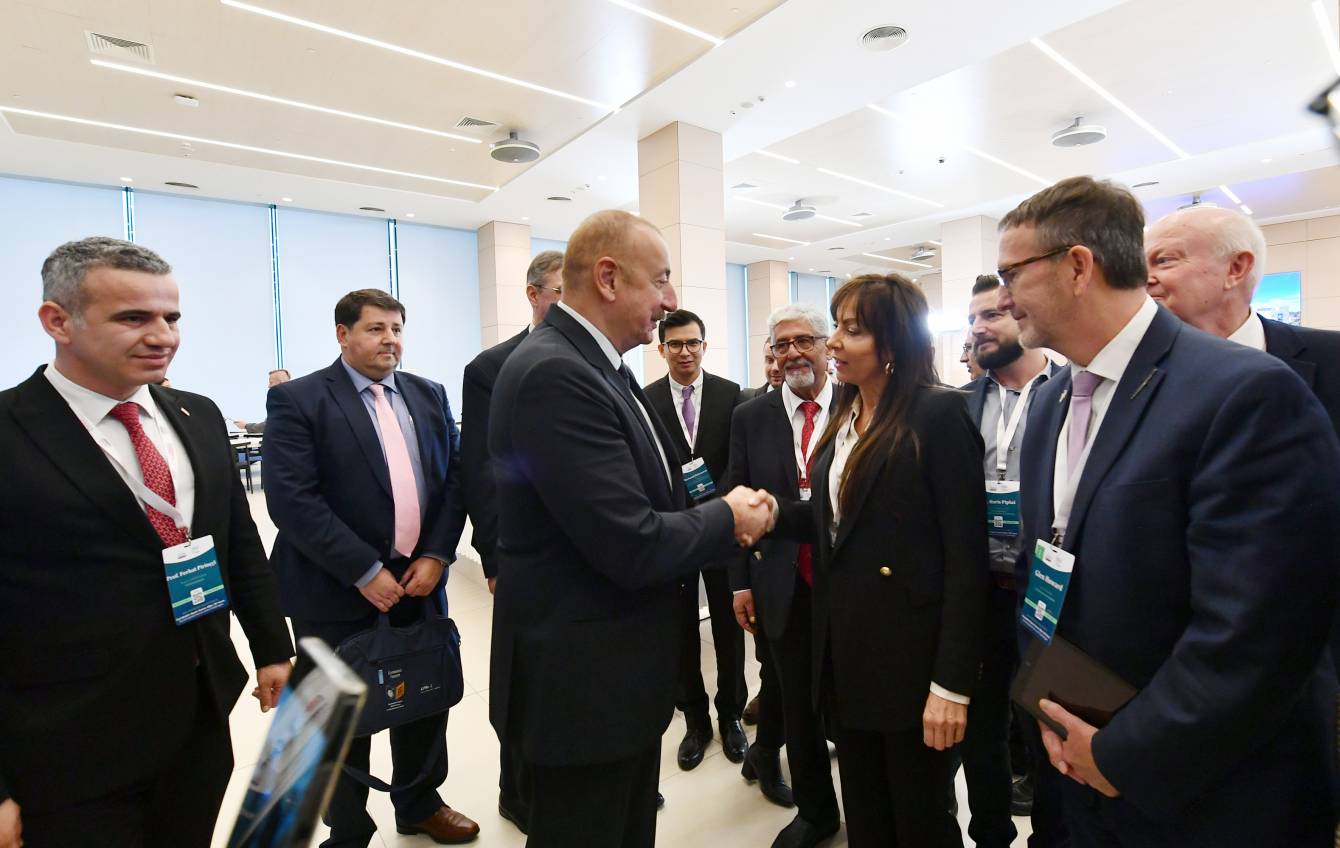
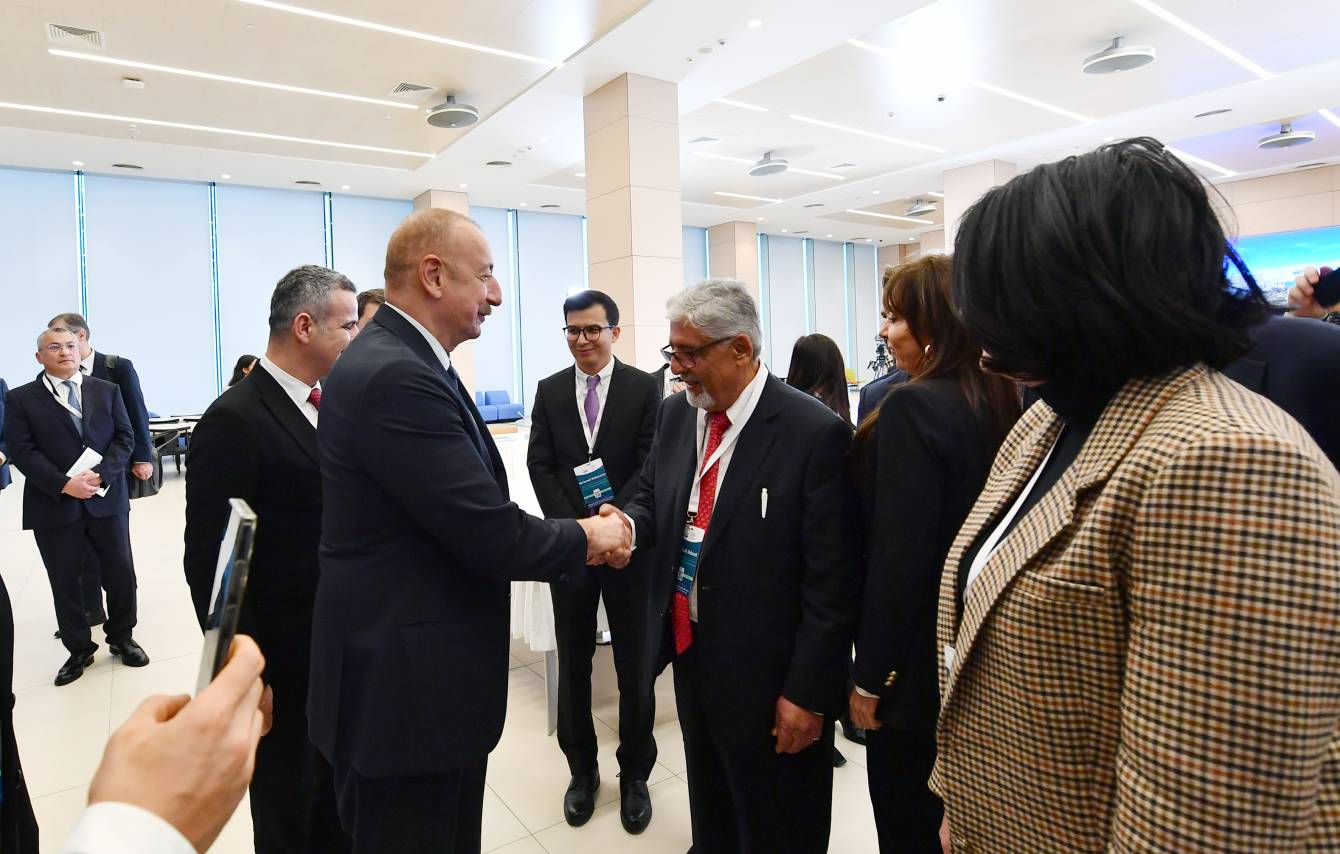
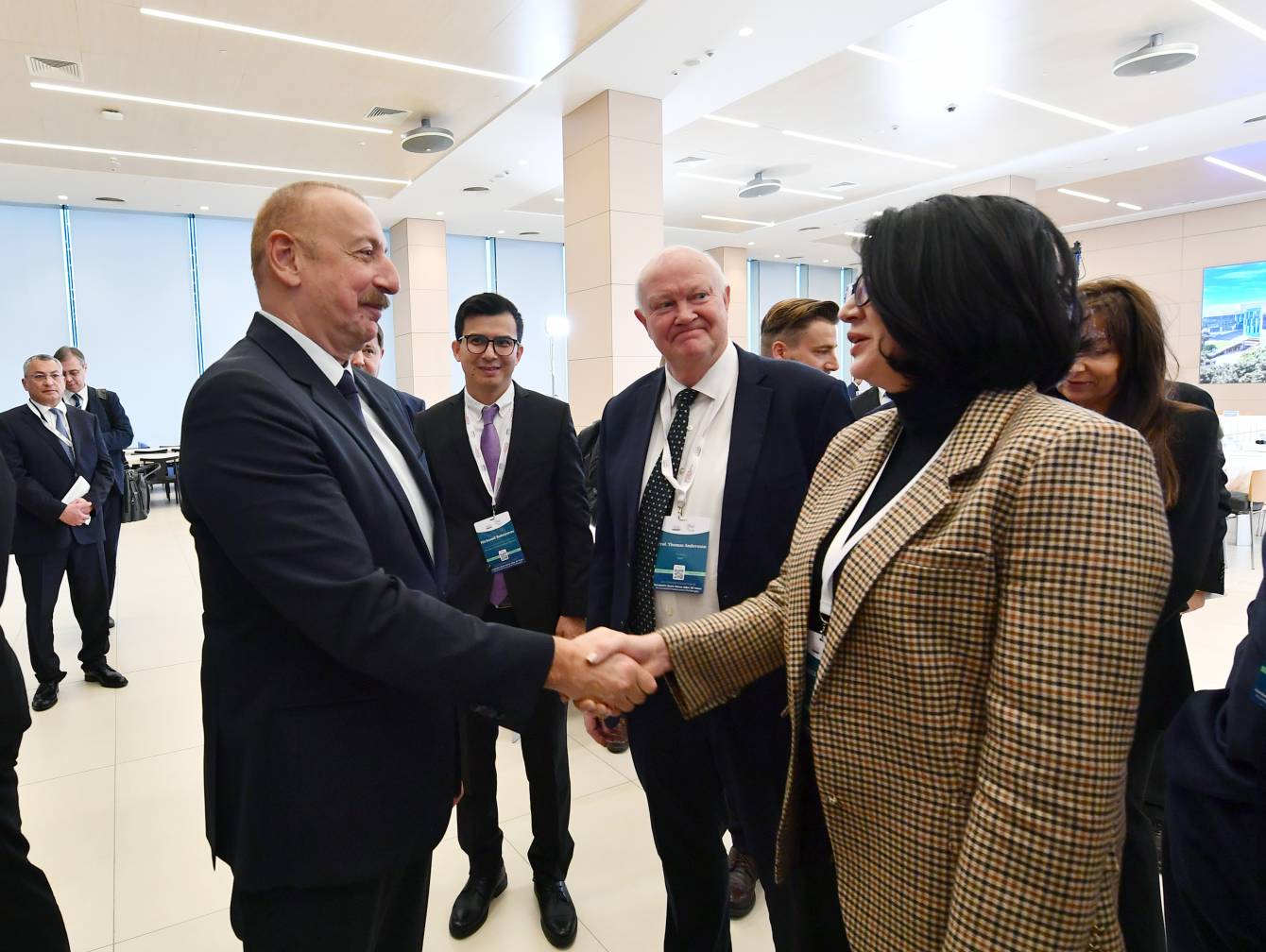
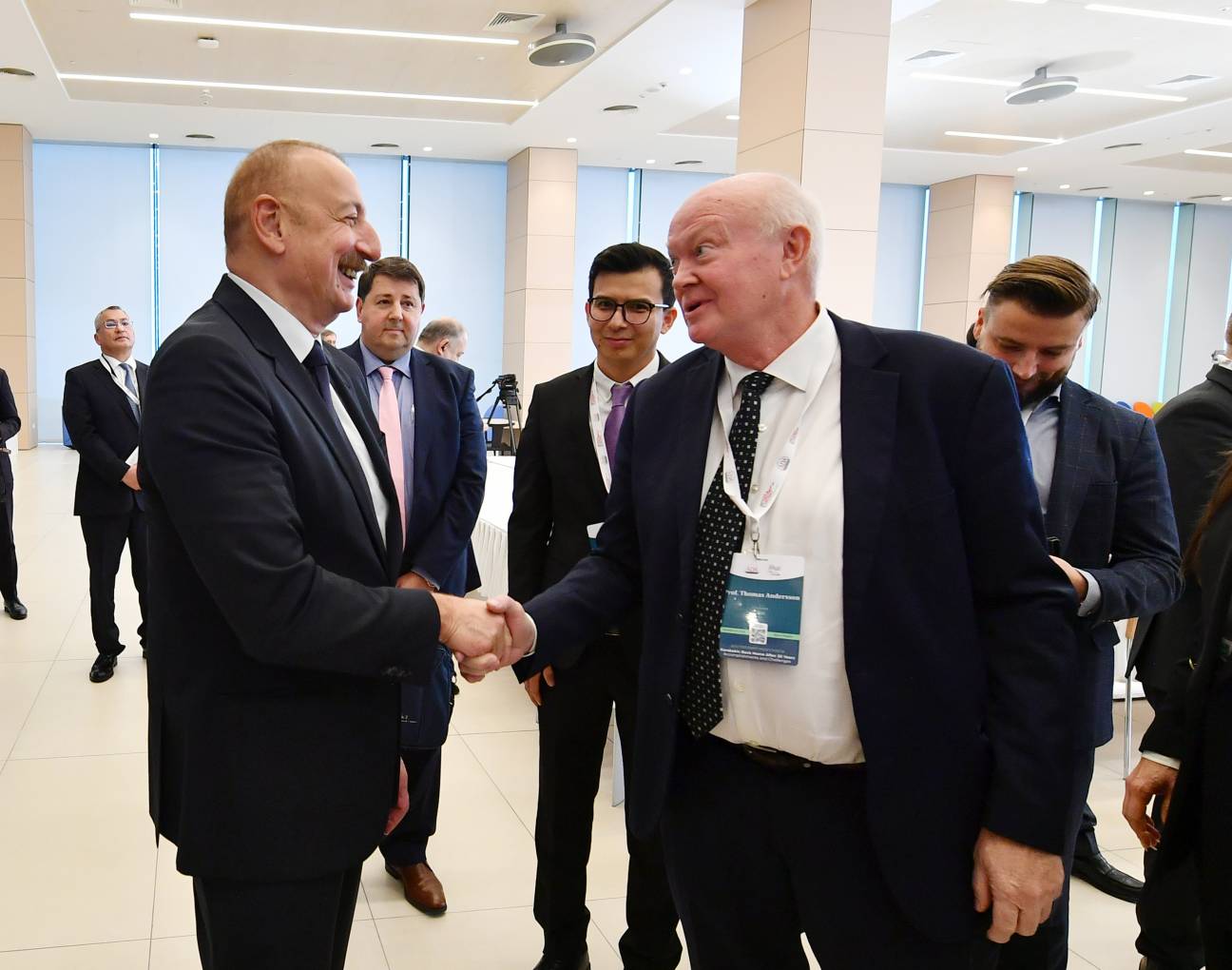
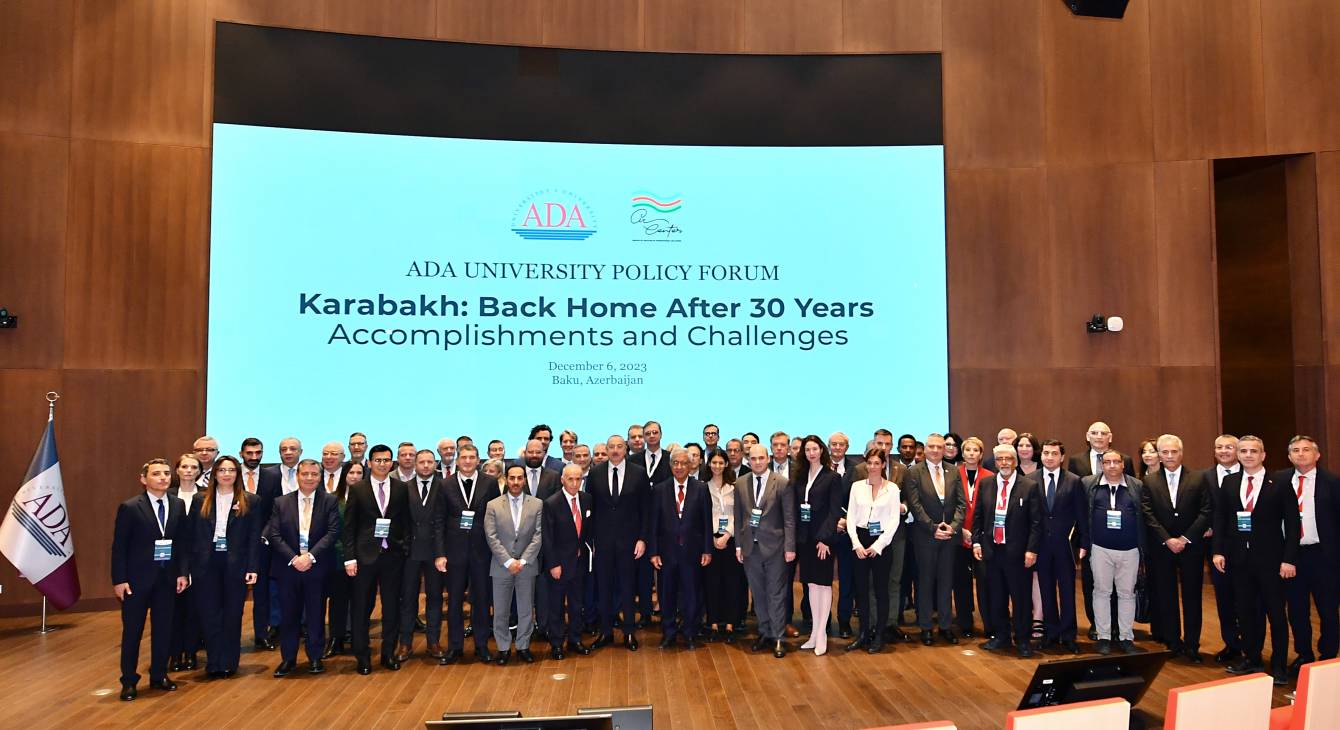

His Excellency Mr. Ilham Aliyev, President of the Republic of Azerbaijan
Your Excellency,
On behalf of the people and government of the Hashemite Kingdom of Jordan, I would like to extend to Your Excellency and the great people of Azerbaijan our sincere...
27 May 2025, 17:52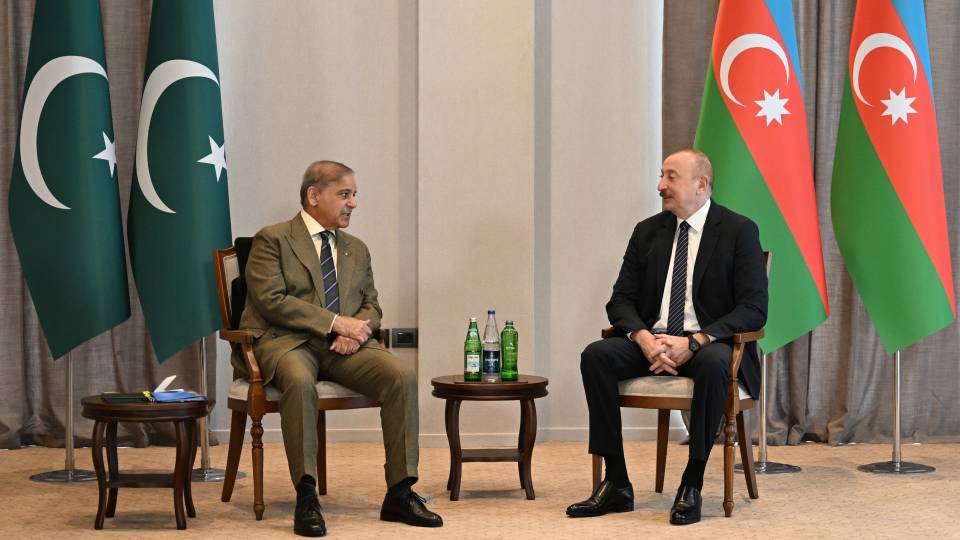
His Excellency Mr. Ilham Aliyev, President of the Republic of Azerbaijan
Excellency,
I am writing to extend my heartfelt felicitations on the occasion of the National Day of the Republic of Azerbaijan. On this auspicious occasion, I convey my best wishes for the...
27 May 2025, 17:21His Excellency Mr. Ilham Aliyev, President of the Republic of Azerbaijan
Excellency,
On behalf of the Government of the Republic of the Philippines, I congratulate the Azerbaijani people on the 107th anniversary of the Independence Day of Azerbaijan.The Philippines...
27 May 2025, 15:47His Excellency Mr. Ilham Aliyev, President of the Republic of Azerbaijan
Your Excellency,Allow me, on behalf of the citizens of my country and on my personal behalf, to cordially congratulate you and the friendly people of the Republic of Azerbaijan on the National...
27 May 2025, 14:56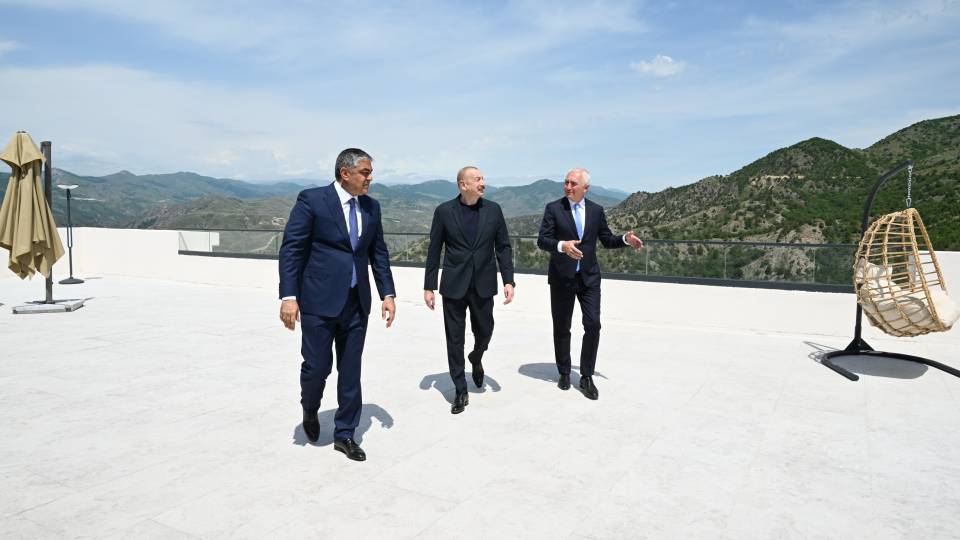
His Excellency Mr. Ilham Aliyev, President of the Republic of Azerbaijan
On the occasion of the Independence Day and National Day of the Republic of Azerbaijan, I wish to extend to Your Excellency my sincere felicitations and best wishes for your good health and...
27 May 2025, 14:28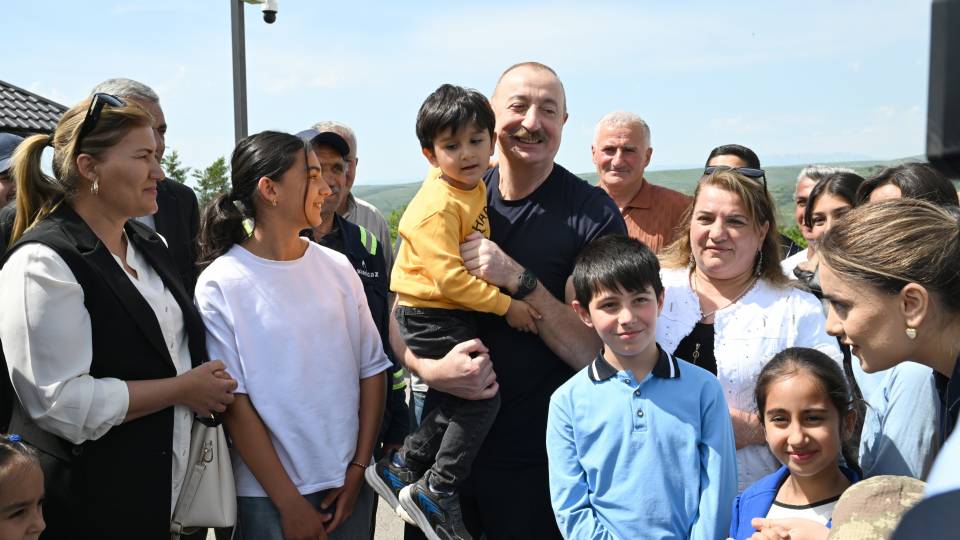
His Excellency Mr. Ilham Aliyev, President of the Republic of Azerbaijan
Dear Mr. President,
On the occasion of the National Day of the Republic of Azerbaijan, it is a pleasure to extend, on behalf of the citizens of the Republic of Croatia and on my behalf, warm...
27 May 2025, 13:56Hix Excellency Mr. Ilham Aliyev, President of the Republic of Azerbaijan
Dear Ilham Heydarovich,
It gives me great pleasure to extend to you and to the friendly people of the Republic of Azerbaijan my heartfelt congratulations and best wishes on the occasion of your...
27 May 2025, 13:54His Excellency Mr. Ilham Aliyev, President of the Republic of Azerbaijan
Your Excellency,
It is my profound privilege to share my warmest congratulations to you and the people of Azerbaijan on the occasion of your Independence Day. The people of Israel join me in...
27 May 2025, 13:39